Oct 2015
Oct 2015 Estelle GreeffTranslations:
Government heeds Eersterust’s call
Government heeds Eersterust’s call Estelle GreeffGovernment is serious about hitting the ground running when it comes to helping communities that reach out for help and the Eersterust community, east of Pretoria, is no exception.
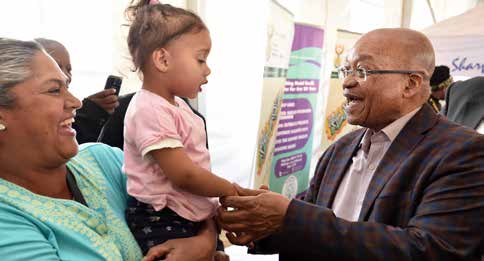 President Jacob Zuma recently held an Imbizo with the community to show government’s commitment to the fight against drug and substance abuse and promote youth development in Eersterust and surrounding areas.
President Jacob Zuma recently held an Imbizo with the community to show government’s commitment to the fight against drug and substance abuse and promote youth development in Eersterust and surrounding areas.
The Presidential Imbizo gave the President first-hand knowledge and an understanding of the challenges faced by the community.
A number of challenges face the community, from drug and substance abuse and drug syndicates operating in the area to low income levels and high crime and unemployment, all of which have a negative impact on the youth and those searching for a better life.
According to community representatives, the drug abuse problem is affecting 15 000 youth – mostly school learners who end up dropping out of school.
President Zuma said police have been running operations aimed at arresting drug runners, the kingpins behind them, and other criminal elements operating in the community.
“About 69 crime intelligence operations have been conducted so far in the area and have led to the arrest of 55 alleged drug dealers. Police are further working with community based anti-crime organisations and security cluster partners in conducting awareness campaigns against drugs and crime in general in the area…”
The President added that the City of Tshwane had registered 1 024 poor families from the community who were receiving free basic services, and during the road show held in July, the City also helped 187 families in need of help.
“The City also donated recently R100 000 to two Early Childhood Development Centres in the community,” said President Zuma.
Before the Presidential Imbizo, a number of ministers visited the area to work with the communities to find solutions to the challenges they are facing.
Social Development Minister Bathabile Dlamini addressed residents during the International Day against Drug Abuse and Illicit Trafficking where a number of young people admitted to smoking "nyaope" - a mixture of crystal meth, heroin and marijuana.
Minister Dlamini said the department would help the youngsters and take them to the best drug and substance abuse rehabilitation centres in the country, but urged them to commit to going back to their communities as better people.
Eersterust Local Drug Action Committee Chairperson, Desiree Fischer, said the committee had developed a programme of action to help save the lives of vulnerable individuals.
Education is the key
Minister in The Presidency for Planning, Monitoring and Evaluation, Jeff Radebe, also visited the area recently and encouraged learners to work hard at school, despite the challenges they face.
“Education will give you the opportunity to be better than your parents, so your responsibility is to persevere so that you can become better citizens and the leaders of tomorrow,” he said.
The Minister visited Eersterust Secondary School and Prosperitas High School to listen to and understand the challenges that learners and educators face. He appealed to learners to not focus on their negative surroundings, but to rather concentrate on the positive side of life.
“Let your dreams of a brighter future inspire you. You need to aspire to be someone in life. You must aspire to become teachers, nurses, doctors, scientists, astrologists etc. The sky is the limit in South Africa,” he said.
Minister Radebe also encouraged learners to aspire to be entrepreneurs so they could own their own business and plough back investment into their own community.
Deputy Minister in The Presidency for Planning, Monitoring and Evaluation as well as Youth Development, Buti Manamela, visited Nantes Primary School in Eersterust to encourage learners to focus on their education and to look after their environment.
He visited the school to plant a vegetable garden and fruit trees and encouraged pupils to stay in school and to look after their environment, starting with their new vegetable garden and trees. The produce from the vegetable garden and the fruit trees will help supplement the school’s feeding scheme, which provides a meal to around 400 children daily.
The Deputy Minister stressed that the youth are at the centre of building a better South Africa.
Looking ahead, government has engaged with the police, the youth and other stakeholders in the area to address the community’s concerns and to come up with solutions.
“We are making progress and the President will ensure that we deepen this fight and hand the community back to the people of Eersterust,” said Deputy Minister Manamela.
New youth office for Eersterust
The National Youth Development Agency (NYDA) will open an office in Eersterust before the end of November this year, to provide information to young people about education, career choices, employment and economic opportunities.
The NYDA, working with the City of Tshwane and the province, plans to implement a Youth Build Infrastructure Development Programme in Eersterust, where 100 young people from the community will build 100 houses to address the housing shortage. They will be trained in house building, plumbing and carpentry.
City of Tshwane Mayor Kgosientsho Ramokgopa said the municipality had also allocated R300 million for youth cooperatives and he encouraged young people in the area to start their own cooperatives to fight unemployment.
In addition, R15 million has been set aside for top performing matric learners who produce good results but cannot afford tertiary institution fees.
The City of Tshwane will also work with the community to build communal sports facilities, a move that will inspire the youth to stay off the streets.
Airport breathes life into EC economy
Airport breathes life into EC economy Estelle GreeffThe revamped Mthatha Airport, which boasts a new R700 million terminal building and runway, is set to change the face of the region’s economy and create a number of jobs.
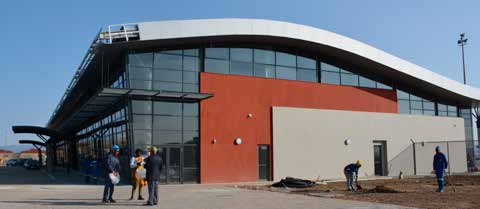 Eastern Cape Premier Phumulo Masualle recently led a media tour of the almost complete airport and has set 30 October as the target date for the official opening of the new-look facility.
Eastern Cape Premier Phumulo Masualle recently led a media tour of the almost complete airport and has set 30 October as the target date for the official opening of the new-look facility.
The upgraded Mthatha Airport was scheduled to be officially opened in April, but a strike in the metal industry and constant rain led to delays.
The airport is situated in the eastern part of the Eastern Cape, an area rich with heritage and home to the Wild Coast, which is frequented by local and international tourists.
The airport’s small runway and terminal building made it unattractive to airlines.
Airlink, the only airline that operates from Mthatha Airport, only offers flights to Johannesburg. But all this is set to change. The provincial government is confident that more airlines will now fly to and from Mthatha Airport, following the massive revamp.
The airport can now receive bigger aircraft and 36 200 passengers have already landed there since April this year. Upgrades to the airport include resting areas for passengers, restaurants and workstations for other airlines. There is also a car hire building, with parking and wash bay facilities.
Safety has been upgraded, mainly to keep stray animals away from the runway, and there are new landing lights that meet international aviation standards.
Mthatha Airport is part of government’s infrastructure build programme and the upgrade was done under the Presidential intervention package in the previous administration. The next step is the development of an office park and a retail and hospitality complex in the airport’s non-aviation zone precinct, which will include a hotel and major conference centre.
During construction at least 223 jobs were created and up to 120 of those employed were youth. Eastern Cape MEC for Transport Weziwe Tikana said a bigger and better Mthatha Airport was important for the province’s economic growth and tourism and will support rural development.
“The unprecedented investment in this airport is indeed making a necessary mark towards correcting the unnecessary imbalance of neglecting areas in former homelands,” she said.
Government’s long-term plan was to reposition the Mthatha Airport as the “gateway” to the eastern part of the Eastern Cape. This will be achieved by transforming the airport into a passenger and freight hub, linking road, rail and air transport.
Land brings opportunities for Nodunga community
Land brings opportunities for Nodunga community Estelle GreeffAaron Zulu (58) never thought the day would come when he would return to the land of his birth after the apartheid system forced him and his family to leave his home.
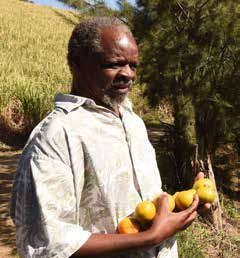 In 1913, thousands of black families were forcibly removed from their land by the apartheid government, following the declaration of the 1913 Natives Land Act.
In 1913, thousands of black families were forcibly removed from their land by the apartheid government, following the declaration of the 1913 Natives Land Act.
They were stripped of their land, homes, livelihood and dignity and were forced into the homelands or relocated to poorly planned and serviced townships.
In 1994, the democratic government identified the need for land and agrarian reform as part of national reconciliation.
“We were forced off our land. Our homes were burnt and our cattle killed,” says Zulu.
Zulu is one of more than 76 000 claimants who received their land back through government’s land restitution programme. The Department of Rural Development and Land Reform has spent more than R24.6 billion on the programme.
Zulu is the chairman of the Nodunga Communal Property Association (CPA), which represents 376 households.
The community of Nodunga recently signed a 10-year lease agreement with packaging and paper company Mondi for commercial forestry on 685 hectares of land, valued at R7.4 million, to help them acquire the necessary skills to benefit from business opportunities on the land.
Claiming the land back
In 2012, after more than 17 years trying to claim back their land, the Nodunga CPA was given about 2 897 hectares back.
“I never thought I would return to my home. I thought it was the end of us because everything we had was taken away,” said Zulu.
Zulu and other community members of Nodunga launched their claim in 1995.
“We encountered a couple of problems, even within the community, which caused certain delays. Initially we didn't know where to go to get help to claim our land back.”
Zulu said the real work of reclaiming their land started in 2008 when government officials made regular visits to the land, which was occupied by farmers, to evaluate it.
“During this process we were working with the KwaZulu-Natal Commission on Restitution of Land Rights. It was difficult because some of the community members had moved and were living in other areas so we had to advertise in the media to try and find them.”
The KwaZulu-Natal Commission on Restitution of Land Rights falls under the provincial department of Agriculture and Rural Development.
Once the claimants of Nodunga were found, they formed the Nodunga CPA.
“We called on people who might have skills in accounting or running a business because we had a goal for the farm. There are seven of us on the committee.”
Employment opportunities
The CPA registered Nodunga Farming, which is run by three directors, to enable the community to do business on the land they claimed back.
Nodunga Farming also received R17.8 million from the department’s Recapitalisation and Development Programme (RADP) which was introduced in 2009.
The RADP provides training and development to those who have received land through the land reform programme.
“When we officially got the land back in 2012 we had nothing to run the farms or start a business with. The farms were in a very bad condition and there was no electricity.”
Today Nodunga Farming produces sugarcane, mangos, naartjies, litchis and macadamia nuts.
There are 239 community members working on the farm and 42 casual workers.
Investing in the community
Apart from providing employment opportunities, Nodunga Farming also supplies uniforms to five schools, for 1 500 children, every year.
“We saw a need to develop the schools in this area by supplying uniforms. We also help with recreational activities and sports kits to make children interested in school.”
Nodunga Farming also helps less fortunate families. It has built houses for them and also provides grocery vouchers.
“So far we have built three houses for members of the community. Community members are allowed to make submissions for their needs. It can be anything from help with funerals or education bursaries. We evaluate the submissions and help where we can.”
During the company’s last financial year, its turnover was R17 million, mainly sourced from 36 tons of sugarcane it produced.
Advice to other land beneficiaries
Zulu said that to become a successful farmer one needs passion.
“The returns in the business are there, but you need to be patient. You also need to know how to manage a business and you need to know the running costs of a farm.”
He added that the beneficiaries must be able to work together to ensure that they can make something out of the land.
“A farming business doesn’t work if there are too many misunderstandings.”
Jabulani Dube, the financial director, said beneficiaries must be trained before they take land over.
“We had knowledge of farming sugar cane which was advantageous. We would like to even mentor people entering this sector.”
Mobile office makes land claims easy
Mobile office makes land claims easy Estelle GreeffA mobile land restitution office will be travelling around KwaZulu-Natal (KZN) and the Eastern Cape to make the process of lodging a land claim easier.
The mobile office, a bus, forms part of government’s Land Restitution Programme.
The land claims process enables people who were forcibly removed from their land under apartheid to lodge land claims.
KZN only has two lodgement offices, in Pietermaritzburg and Vryheid, and the mobile office will enable people to lodge their claims closer to their homes.
The bus will be shared with the Eastern Cape, spending three months at a time in each province.
KZN MEC for Agriculture and Rural Development Cyril Xaba said the bus is fitted with technology to process the claims electronically.
“Government is confident that the process will work much faster because all claims will be lodged electronically,” he said.
In February last year Parliament passed the Restitution of Land Rights Amendment Bill, which reopened the land restitution process.
The new deadline for land claims has been extended to 31 December 2018 and applies to any person dispossessed of their property after 19 June 1913.
The restitution programme has provided compensation to a large number of victims who had their land taken and lodged claims by 31 December 1998, the former cut-off date.
In KZN, 16 000 claims were lodged during the first land claim period.
“Of these, 14 000 have been processed and only 2 000 are outstanding. These are to be processed simultaneously with the new claims, with priority for payment given to those lodged before 1998.”
According to the national Department of Rural Development and Land Reform 76 000 land claims had been settled by March 2012.
More than a million beneficiaries around the country received just over two million hectares of land.
The total expenditure for the land restitution programme was R24.6 billion.
How to lodge a land claim
STEP1: Reception
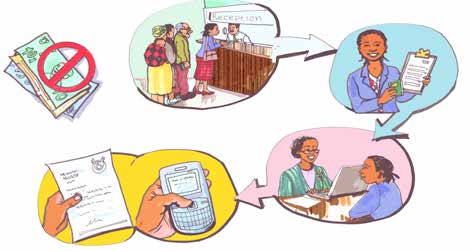 The staff at the reception desk will check whether you have all the correct documents and give you advice
The staff at the reception desk will check whether you have all the correct documents and give you advice
STEP 2: Capturing
The staff in the capturing section will assist you to electronically capture your claim
STEP 3: Confirmation
You will receive a letter after the capturing of your claim information. The letter will have a unique reference number proving that you have successfully logged a claim.
STEP 4: Notification
You will receive an SMS within 48 hours after lodgement confirming that we have received your claim. Your claim will be investigated and you will be notified about the progress at regular intervals, or upon your request.
How to follow up: You can phone the toll-free number 0800 007 095 or contact any of the 14 lodgement offices across the country.
Where can you lodge your claim?
Gauteng: 9 Bailey Street ,Corner Steve Biko and Johannes Ramokhoase Street, Arcadia, Pretoria. Tel: 012 310 6500
Free State: Old Postbank Building, (Corner East Burger and Selbourne Street, Bloemfontein). Tel: 015 430 0444
KwaZulu-Natal: Umhlaba House, 139 Langalibalele Street, Pietermaritzburg and 158 -160 High Street, Vryheid. Tel: 033 341 2674
Eastern Cape: Old SARS Building, 22 Station Street, East London and 66 Prince Alfred Street, Queenstown. Tel: 043 722 1487
Northern Cape: Hyesco Arcade, 4 – 8 Old Main Road, Kimberley. Tel: 053 807 5700
North West: Unit 4 Batlhaping Street, (Next to SARS Building), Mmabatho and Prime Plaza Building 52 Market Street, Vryburg. Tel: 018 389 9658/9600
Western Cape: Van der Sterr Building, Rhodes Avenue, Mowbray, Cape Town and 33 Shamrock Place, 97 York Street, George. Tel: 021 658 4300
Limpopo: 61 Biccard Street, Polokwane. Tel: 015 284 6300
Mpumalanga: Restitution House, 30 Samora Machel Drive, Mbombela and 23 Hi-tech House Corner Botha and Rhodes Streets, eMalahleni.Tel: 013 752 4054
South Africa is moving forward
South Africa is moving forward Estelle GreeffThe constantly changing skylines of our country’s major urban centres and the bustle of development in suburban areas tell the story of South Africa moving forward.
 New office towers, improved freeways, traffic signals and traffic calming measures in townships where traffic chaos once reigned, are signs of the positive change that is unfolding in our country each day.
New office towers, improved freeways, traffic signals and traffic calming measures in townships where traffic chaos once reigned, are signs of the positive change that is unfolding in our country each day.
Revamped schools, fresh court buildings and technology-rich schools are being built in communities which for decades had to travel long distances to get to such amenities in other areas.
Given the rate at which South Africans are settling in our urban areas, it’s understandable that centres such as Johannesburg, Durban, Cape Town, Kimberley or Mangaung dominate the news and public attention on our development.
But the story of South Africa’s development is not confined to such places. Development is speeding up in all corners of our country, and the absence of headlines does not mean there’s an absence of change.
Just recently, I was honoured to visit Lephalale in Limpopo Province, to open the 800kW Unit 6 at Medupi power station, which is destined to become the world’s largest dry-cooled coal-fired power station.
Lephalale Municipality is situated in the northwestern part of Limpopo Province and borders Thabazimbi, Modimolle, Mogalakwena and Blouberg municipalities. It is also a gateway to Botswana, with four international border posts in the region.
This is a place millions of South Africans will probably never visit in their lifetime – which would be a pity indeed.
Yet, it’s a place that is adding to the quality of life of all South Africans every single day, given its importance as a centre of electricity production, drawing the rich coal reserves under the ground in this beautiful corner of our land.
Electricity generated at Medupi courses through power lines across South Africa, bringing light, heat and industrial energy to households and factories.
The Medupi power station is a perfect example of the broad impact that megaprojects of this kind have on local economies and the national economy.
The town of Lephalale’s gross domestic product (GDP) – all the goods and services produced in a year - has increased by about 95 per cent per year as a result of the building works.
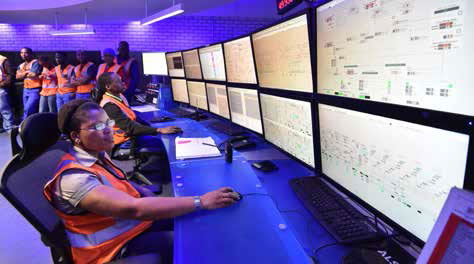 At the peak of the construction, about 18 000 construction employees and 2 000 supporting staff were employed here, sourced mostly from the local areas, thus contributing to the improvement of local skills.
At the peak of the construction, about 18 000 construction employees and 2 000 supporting staff were employed here, sourced mostly from the local areas, thus contributing to the improvement of local skills.
There are currently more than 13 000 employees on site at Medupi, while nearby Kusile has 14 000.
In all these projects, South African companies were prioritised for procurement and obtained 62 per cent of the R75 billion of the contracts for the new power station build programme.
Other added benefits of the Medupi project included skills development, which was part of the contractual obligations, targeting skills such as boiler making, coded welding, engineering.
So far 2 513 candidates have completed their training, and the majority of those are working within the project. About 90 per cent of the candidates at this facility come from within Limpopo province.
In addition, since 2011, a total of 74 emerging contractors and suppliers have successfully completed the Eskom Contractor Academy, a registered programme offered in partnership with the University of Limpopo.
Eskom has also spent about R6 million on the training of business owners to benefit their businesses and the community. A total of 28 other local business owners and agricultural co-operatives were trained, mentored and coached. The project is also making an impact in career guidance.
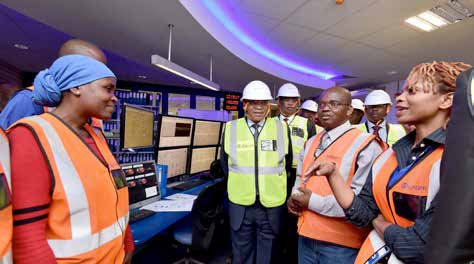 To date, 7 048 learners and students have received an opportunity to visit the Medupi project, as part of their school outreach programmes or university students’ exposure to megaprojects like this one.
To date, 7 048 learners and students have received an opportunity to visit the Medupi project, as part of their school outreach programmes or university students’ exposure to megaprojects like this one.
There are many more impressive numbers about the great work being done at Medupi and the change communities are experiencing in the Lephalale area.
But the most impressive thing about this work is the spirit among engineers, artisans, suppliers of equipment and executives in the public and private sector partners who are making this project succeed.
In spite of difficulties and setbacks we have experienced since the project began in 2007, our march to completion has been steady.
The march at Medupi is the march on which our nation has embarked to a better future.
This is a march of hope, not hopelessness, and it is a march that says each one of us as South Africans are the creators of a hopeful future.
The smallest contributions by individuals have a role to play in our greatest achievements as a nation.
Medupi and Lephalale teach us that we cannot judge our progress by the headlines we read or hear each day; we judge our progress by the hard work and pride of every South African who gets up each morning to make this a better place.
These are our national heroes. Let’s keep marching.
Home Affairs improves services for all
Home Affairs improves services for all Estelle GreeffFrom January 2016, parents who register the birth of their children after 30 days will have to prove to the Department of Home Affairs that they are really South African citizens.
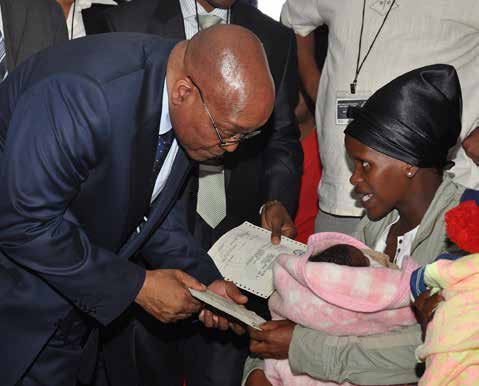 This is according to the Director-General of the Department of Home Affairs, Mkuseli Apleni, who recently spoke to Vuk’uzenzele.
This is according to the Director-General of the Department of Home Affairs, Mkuseli Apleni, who recently spoke to Vuk’uzenzele.
He said it was the responsibility of all parents to ensure that newborn babies are registered with the Department of Home Affairs within 30 days of their birth.
“If this is not done, parents will have to explain why they were unable to register their child within 30 days. Based on their explanation, their application has to be approved by the Director-General or the Minister as we need to make sure that parents understand that they have to comply with this legislation.”
President Jacob Zuma and the former Minister of Home Affairs, Dr Nkosazana Dlamini-Zuma, launched the late registration of births programme in 2010 to ensure that people register the birth of their children within the required time.
“The department’s policy says the first entry of our national population register is by registration of birth. In the past people did not understand why they had to register their children.”
Apleni said there were over 300 hospitals in the country that were working with the department to ensure that children are registered at birth.
When the late registration of birth programme was launched, the department had about 500 000 late birth registrations.
“This number has dropped to below 100 000.”
According to Apleni, new born who are not registered within 30 days are unable to receive state grants as an unabridged birth certificate is needed to apply.
Registering children helps the state to plan for the future.
Apleni said that his department was working with other government departments as part of Operation Fiela to make sure that South Africans feel safe.
“South Africans and foreign nationals need to abide by the laws. There is a misconception that Operation Fiela only targets foreign nationals. In South Africa we have an integrated approach. When police conduct raids, in collaboration with the Department of Home Affairs and other government departments, they arrest anyone found with drugs, whether they are a South African citizen or a foreign national.”
Operation Pyramid
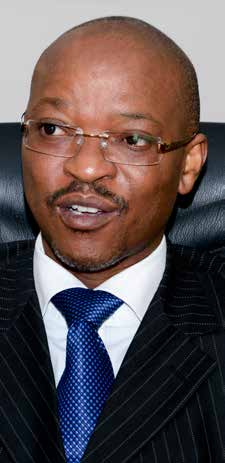 The department also launched Operation Pyramid to ensure tougher border control.
The department also launched Operation Pyramid to ensure tougher border control.
The aim of Operation Pyramid is to lay the foundation for the Border Management Agency (BMA) to improve overall co-ordination and co-operation between government and civil society partners to secure the country’s land, air and maritime borderline.
During the launch of the programme recently, Home Affairs Minister Malusi Gigaba said challenges facing border management are human movement, transnational organised crime, criminal activities, terrorism, endangered species, natural resources and animal, plant and human diseases.
Gigaba added that large parts of airspace and coastline are vulnerable to illegal airspace and maritime movement.
The BMA will be responsible for port of entry infrastructure and maintenance and will establish its own organisational culture, identity and conditions of service.
Apleni said the Department of Home Affairs was working closely with 11 government departments to establish the BMA.
“I want to bring all these responsibilities under one agency. By 2017, border management will be in place.”
Home Affairs goes digital
Apleni said these are exciting times for the department as it prepares to boost its services with the aid of technology that will ensure that Home Affairs runs efficiently.
“People will be able to apply for a passport or smart card ID at their leisure, online and pay via electronic transfer. They only have to visit the bank to have their fingerprints and photograph taken."
The department has partnered with banks to enable people to apply via their bank.
“We think technology is the answer. After applying for a passport, it should take a maximum of 13 days for it to be received”
For more information contact: 0800 60 11 90
Communities get a lift
Communities get a lift Estelle GreeffThe need to see the community uplifted led young professional Yolanda Madyira, 27, to become part of the Jessica Fortuin Fellowship (JFF), a two-year programme that promotes
community development.
Every two years, 33 youth are selected for the programme, which teaches them how to establish and run sustainable civil society organisations that play an active role in developing communities.
They also learn how to run income-generating initiatives that benefit their communities and themselves.
The JFF, a National Development Agency (NDA) programme that aims to take charge and change the socio-economic conditions of communities, was named after the late Jessica Fortuin, a veteran social worker who joined the NDA in 2003 and has been active in social development for 34 years.
“It is very important that as young people we are active in the development of our community. We have the power to shape change and tackle social ills such as substance abuse and the violence in society,” said Madyira.
The NDA launched the JFF in 2014 to enhance community development by identifying and developing young graduates in the fields of social work, development studies, research and human and social sciences.
The NDA, an agency of the Department of Social Development, is tasked with poverty eradication through engaging civil society organisations and skilling them to empower communities.
Madyira, who holds a degree in political science from the University of Western Cape, said that before she joined the JFF she could not find a job.
Based at the NDA’s Cape Town office, Madyira started her training last year. She said she enjoys working with non-profit organisations (NPOs), because it helps to uplift the country.
“The work that I am doing is giving me hands-on experience with working with NPOs. We help train people within organisations and teach them how a proper NPO should run as their aim is to help the community.
“Being part of this programme has also taught me what it means when people are less fortunate. I am constantly looking for ways to help NPOs that I work with to become better.”
Chief Executive Officer of the NDA, Dr Vuyelwa Nhlapo said the programme provides young people with an opportunity to gain work experience, focused direction and inspiration for development and achievement.
“Through this programme, we prepare the youth to live up to their full potential and drive their own and their community’s path to development and success,” said Dr Nhlapo.
The NDA also contributes towards research in the development sector and has exposed some of the graduates to opportunities in the research discipline.
It recognises that it is important for the youth to be encouraged to go into the development sector and to play an active role in poverty alleviation.
“This sector needs innovative minds to come up with programmes and projects to empower poor and rural communities and encourage partnerships between communities, civil society, government and the private sector,” said Dr Nhlapo.
Growing need for social workers
Earlier this year Minister of Social Development Bathabile Dlamini said at the Social Work Indaba that there was a demand for social workers in the country.
Currently, the ratio of supervisor to practitioner ranges from 1:10 to 1:13 depending on the area they are in, leaving many practitioners working without supervision.
The department also stated that the ratio of social workers to the population countrywide is estimated at 1:5000, well above recommended levels. This is worsened by the fact that social workers are expected by communities to be ‘general development workers’.
The effect of this is poor implementation of norms and standards in social work practice.
In order to meet the 55 000 social service practitioner target, as set out by the National Development Plan, the department has rolled out a scholarship programme that funds students who want to study social work at universities.
Since the scholarship programme started about 8 000 young people have graduated with the department’s assistance. More than 3 500 of these have been absorbed into the public service. The department is working closely with provinces to address the issue of absorption.
For more information contact: 011 081 5500
Jobs: Department of Social Development
Jobs: Department of Social Development Estelle GreeffDIRECTOR: EARLY CHILDHOOD DEVELOPMENT (Ref. 2015/33)
Chief Directorate: Early Childhood Development
Package: R864 177 p. a This inclusive remuneration package consists of a basic salary, the states’ contribution to the Government Employees Pension Fund and a flexible portion that may be structured i. t. o the applicable rules.
Centre: HSRC Building, Pretoria
REQUIREMENTS: An appropriate Degree in Social Sciences or equivalent qualification (NQF level 7) PLUS 5 years of experience at a middle/senior management level. Knowledge of the relevant Public Service legislation. Knowledge and understanding of Children’s Act. Knowledge and understanding of education and social development policies, strategies and programmes pertaining to ECD. Knowledge and understanding of government policies and approach to ECD and Partial Care.
Competencies: Strategic capability and leadership skills. Programme and project management skills. Financial management skills. Policy analysis and development skills. Information and knowledge management skills. Communication (verbal and written) skills. Service delivery innovation skills. Problem-solving and change management skills. People management and empowerment skills. Client orientation and customer focus skills. Stakeholder management skills. Presentation and facilitation skills.
Attributes: Good interpersonal relations. Ability to work under pressure. Creative and innovative. Ability to work in a team and independently. Adaptability. Diplomatic. Independent thinker. Cost consciousness. Honesty and Integrity.
Duties: Develop and facilitate the implementation of strategies and programmes relating to the delivery of early childhood development and partial care services. Design and support the implementation of programmes aimed at stimulating, learning and development and provide implementation support services. Conduct compliance monitoring and impact assessment on the implementation of services and programmes. Design and conduct capacity development programmes to provincial and local government.
Enquiries: Ms MV Ngcobo-Mbere, Tel: 012 312 7948
Note: Curriculum vitae with a detailed description of duties, the names of two referees and certified copies of qualifications and identity document must accompany your signed application for employment (Z83). In the event of hand delivery of applications, applicants must sign an application register book as proof of submission. All shortlisted candidates for SMS posts will be subjected to a technical exercise that intends to test relevant technical elements of the job, the logistics of which will be communicated by the Department. Following the interview and technical exercise, the selection panel will recommend candidates to attend a generic managerial competency assessment (in compliance with the DPSA Directive on the implementation of competency based assessments). The competency assessment will be testing generic managerial competencies using the mandated DPSA SMS competency assessment tools. The successful candidate will sign an annual performance agreement, complete a financial discloser form and will also be required to undergo a security clearance. If the candidate is applying for an OSD post, certificates of service must be attached to the CV. It is the applicant’s responsibility to have foreign qualifications evaluated by the South African Qualification Authority (SAQA). Failure to submit the requested documents will result in your application not being considered. Personnel suitability checks will be conducted on short listed candidates and the appointment is subject to positive outcomes of the checks. Correspondence will be limited to shortlisted candidates only. The selection of candidates will be done with due regard to the relevant aspects of the selection process as set out in the Public Service Regulations, 2001 (as amended) Part VII/D. Applications received after the closing date will not be taken into consideration. No faxed or e-mailed applications will be considered. If you have not been contacted within three months after the closing date of this advertisement, please accept that your application was unsuccessful.
It is our intention to promote representivity (race, gender and disability) in the Public Service through filling of this post and candidates whose transfer / promotion/ appointment will promote representivity will receive preference.
APPLICATIONS:
The Director General, Department of Social Development, Private Bag X901, Pretoria, 0001, Physical Address: HSRC Building, 134 Pretorius Street
FOR ATTENTION: Ms E de Waal
CLOSING DATE: 9 October 2015
DSD supports persons with disabilities.
Jobs: Government Communication & Information System
Jobs: Government Communication & Information System Estelle GreeffDeputy Director: Marketing and Distribution
Directorate: Marketing and Distribution
Package: All-inclusive remuneration package R 569 538 per annum.
Centre: Pretoria
Requirements: An appropriate 3- year degree or equivalent qualifications and with alteast three years extensive experience and knowledge in the fields of marketing, distribution, advertising and advertising sales, public relations, events management and project management. Well-developed communication including both verbal and writing skills and interpersonal skills. Knowledge of the marketing communications and distribution industry is essential, with specific reference to the public sector operations. Intricate knowledge of developing marketing, advertising and distribution strategies. Strong negotiation and liaison skills with relevant stakeholders and management of products distribution. Excellent report writing skills. Ability to work under pressure and independently. Must be willing to work after hours as and when required. Valid driver’s licence.
Duties: Plan, develop and implement an integrated Marketing Communication plans for GCIS’ services and its products. Conceptualization and drafting of marketing strategies, briefs, memoranda, reports, specifications, motivations and all relevant documentation requiring special expertise in the fields of marketing communications. Liaison with clients, agencies, government departments and service providers. Establish distribution networks and develop distribution strategies. Build the distribution capacity by ensuring that appropriate database for distribution networks for GCIS products are in place and the monitoring of the quality thereof. Assist in managing the marketing and promotions of GCIS products and platforms to relevant stakeholders and target audiences when required. Sourcing and securing of sponsorships for selected flagship projects. Management of marketing and distribution systems, projects and personnel. Plan, coordinate and manage GCIS activations, exhibitions or outreach programmes or any other ad hoc event when required. Conduct impact analysis to evaluate marketing and promotional plans. Manage the day to day marketing activities by carrying out a variety of essential support functions. Management of all activities relating to the distribution of GCIS produced products or ad hoc requests from internal or external clients.
Enquiries: Ms N Prinsloo, Tel: 012 473 0203
Note: Applications must be submitted on form Z83, obtainable from any Public Service Department or on the internet at www.gov.za/documents. The completed and signed form Z83 should be accompanied by a recently updated, comprehensive CV as well as certified copies of all qualification(s) and ID-document. The certification must be within three (3) months. Should you be in possession of a foreign qualification, it must be accompanied by an evaluation certificate from the South African Qualification Authority (SAQA).
Applicants who do not comply with the above-mentioned requirements, as well as applications received late, will not be considered. Failure to submit all the requested documents will result in the application not being considered. Correspondence will be limited to short-listed candidates only. If you have not
been contacted within three (3) months after the closing date of this advertisement, please accept that your application was unsuccessful. Suitable candidates will be subjected to a personnel suitability check (criminal record, citizenship, credit record checks, qualification verification and employment verification). “The successful candidate must disclose to the DG particulars of all registrable financial interests”. (Criminal record, citizenship, credit record checks, qualification verification and employment verification).
GCIS is an equal opportunity employer. Disabled applicants are welcome to apply.
APPLICATIONS:
The Director-General, Government Communication and Information System, Private Bag X745, Pretoria,0001 or Hand deliver to Tshedimosetso House,1035 Cnr Francis Baard & Festival streets, Hatfield, Pretoria.
FOR ATTENTION: Mr S Matshageng
CLOSING DATE: 12 October 2015
Jobs: Department of Justice and Constitutional Development
Jobs: Department of Justice and Constitutional Development Estelle Greeff
STATE LAW ADVISER LP7- LP8
REFERENCE: 15/287/LD
PACKAGE: R592 806 – R983 454 per annum. (Salary will be in accordance with OSD determination). The successful candidate will be required to sign a performance agreement.
REQUIREMENTS: LLB or 4 year recognized legal qualification; At least 5 years appropriate post qualification advisory experience; Admission as an Advocate or Attorney; Experience in Constitutional Law and Administration will be an added advantage; Knowledge of the Public Finance Management Act (PFMA); A valid drivers licence.
ENQUIRIES: Ms P Leshilo 012 357–8240
CLOSING DATE IS 15 OCTOBER 2015
COURT MANAGER
REFERENCE:15/VA104/NW
SALARY: R361 659.00 – R426 009.00 per annum. The successful candidate will be required to sign a performance agreement.
REQUIREMENTS: Three (3) year qualification in Administration and / or National Diploma Services Management (NQF level 6) plus the module on Case Flow Management or relevant equivalent qualification; Three (3) year’s managerial or supervisory experience; A valid EB driver’s license; Computer literacy, The following will serve as strong recommendations: Knowledge of an experience in office and district administration; Knowledge of financial management and the PFMA;
ENQUIRIES: Mr. B Sibiya at 018 397 7061.
CLOSING DATE IS 15 OCTOBER 2015
LEGAL ADMINISTRATION OFFICER (MR-3 – MR-5), (CONTRACT POST ENDING 31 MARCH 2016)
REFERENCE NR: 56/14/NC
(This post is a re- advertisement; candidates who previously applied are encouraged to re-apply)
SALARY: R195 945 – R708 765 per annum. (Salary will be determined in accordance with OSD determination). The successful candidate will be required to sign a performance agreement.
REQUIREMENTS: An LLB or four year recognized legal qualification; At least 2 years appropriate post qualification legal experience; Sound knowledge of the South African legal system, legal practice and related spheres with specific reference to family law and related litigation; Knowledge of criminal procedure and practice, court rules (Constitutional, Supreme Court of Appeal, High, Labour, Equality and Magistrate Courts); A valid code EB driver’s license;
ENQUIRIES: Mr. J. Tope 053 802 1300
CLOSING DATE IS 15 OCTOBER 2015
ASSISTANT DIRECTOR: GUARDIAN FUND (TPF)
REFERENCE: 15/292/CFO
SALARY: R289 761 – R341 313 per annum. The successful candidate will be required to sign a performance agreement.
REQUIREMENTS: 3 years Bachelor’s Degree/ National Diploma or equivalent qualification in Finance; 3 years relevant experience in Financial accounting/management environment, of which 1 year should be at supervisory/junior management level; Knowledge of Public Finance Management Act (PFMA) and Treasury Regulations; Knowledge of the Guardian Funds functions and services will serve as recommendation; A valid driver’s licence.
ENQUIRIES: Ms. E Sebelebele 012 357 8662
CLOSING DATE IS 15 OCTOBER 2015
SOCIAL WORK SUPERVISOR (FAMILY COUNSELLOR SUPERVISOR)
REFERENCE: 2015/212/GP
SALARY: R295 635 – R342 720 per annum. (Salary will be in accordance with the OSD determination). The successful candidate will be required to sign a performance agreement.
REQUIREMENTS: Bachelors Degree in Social Work which allows for professional registration with the SACSSP; Professional registration with the SACSSP as a Social Worker; A minimum of 7 years appropriate experience in social work after registration as Social Worker with the SACSSP; Social work supervisory experience will be an added advantage; Knowledge and experience in Mediation; Court experience in evidence, knowledge and application of family law, including mediation in certain divorce matters Act, maintenance Act and Domestic Violence Act, children’s Act( inclusive of Hague Convention on international child abduction); A valid drivers licence
ENQUIRIES: Ms P Raadt 011 332 9000
CLOSING DATE IS 15 OCTOBER 2015
ASSISTANT MASTER, MR3- MR5
REFERENCE: 15/286/MAS
SALARY: R195 945 – R708 765 per annum. (Salary will be in accordance with OSD determination). The successful candidate will be required to sign a performance agreement.
REQUIREMENTS: LLB Degree or four years recognized legal qualification; 2 years appropriate post qualification legal experience; Knowledge of the Administration of Estates Act, Compliance Act, Mental Health Act, Insolvency Act, Companies Act, Close Corporations Act, Trust Property Control Act and other relevant legislation; Experience in the functional field and services provided by Master’s of the High Court.
ENQUIRIES: Mr. S. Maeko Tel: 012 315 1996
CLOSING DATE IS 15 OCTOBER 2015
LEGAL ADMINISTRATION OFFICER: MR3 – MR5 (4 MONTHS CONTRACT)
REFERENCE: 15/289/CLO
SALARY: R195 945 – R708 765 per annum. (Salary will be in accordance with OSD determination). The successful candidate will be required to sign a performance agreement.
REQUIREMENTS: An LLB Degree or 4 year recognized legal qualification; At least 2 years appropriate post qualification legal experience; Knowledge of South African Legal system, and legal practices with specific reference to civil litigation; Knowledge of Multi Department Research; A valid driver’s licence.
NOTE: People with disabilities are encouraged to apply
ENQUIRIES: Miss K. Ngomani (012) 357 8661
CLOSING DATE IS 2 OCTOBER 2015
NOTE:
Interested applicants may visit the following website: www.justice.gov.za or www.dpsa.gov.za to view the full job specification of the above positions. Applications must be submitted on Form Z83, obtainable from any Public Service Department or on the internet at www.gov.za. A Z83 & CV must be accompanied by original certified copies of qualifications and identity document. A driver’s license must be attached if indicated as a requirement. A SAQA evaluation report must accompany foreign qualifications. Applications that do not comply with the above mentioned requirements will not be considered. All shortlisted candidates for SMS posts will be subjected to a technical exercise that intends to test relevant technical elements of the job, the logistics of which will be communicated. Following the interview and technical exercise, the selection panel will recommend candidates to attend a generic managerial competency assessment (in compliance with the DPSA Directive on the implementation of competency based assessments). The competency assessment will be testing generic managerial competencies using the mandated DPSA SMS competency assessment tools. The successful candidate will sign an annual performance agreement, complete a financial disclosure form and also be required to undergo a security clearance. If the candidate is applying for an OSD post, certificates of service must be attached to the CV
The DOJ&CD is an equal opportunity employer. In the filling of vacant posts the objectives of section 195 (1) (i) of the Constitution of South Africa, 1996 (Act No: 108 of 1996), the Employment Equity imperatives as defined by the Employment Equity Act, 1998 (Act No: 55 of 1998) and relevant Human Resources policies of the Department will be taken into consideration. Shortlisted candidates will be subjected to a personnel vetting process. Correspondence will be limited to short-listed candidates only. If you do not hear from us within 3 months of this advertisement, please accept that your application has been unsuccessful. The department reserves the right not to fill these positions. The department reserves the right not to fill these positions. Women and people with disabilities are encouraged to apply and preference will be given to the EE Target.
Gauteng govt revitalises township economies
Gauteng govt revitalises township economies Estelle GreeffBrick-making cooperative Wyse West, located close to Mohlakeng township, could be one of hundreds of township enterprises to benefit from the Gauteng government’s initiative to revamp old industrial parks.
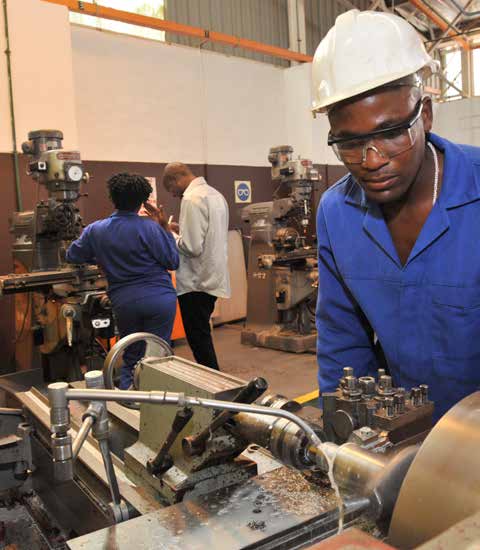 Run by Nicodemus Letlhake and seven other members, the business is excited about the province’s pledge to source 30 per cent of its procurement from township businesses, as part its township revitalisation strategy.
Run by Nicodemus Letlhake and seven other members, the business is excited about the province’s pledge to source 30 per cent of its procurement from township businesses, as part its township revitalisation strategy.
“I think it (the strategy) is something that can benefit us a lot,” said Letlhake at the strategy launch at Orlando Stadium recently.
The municipality helped set up the cooperative in 2013 and last year the members also received help from the Gauteng Enterprise Propeller (GEP).
This included R18 000 worth of marketing assistance, including pamphlets, signage and a website, and access to two exhibitions, where the members were able to make sales to private homeowners. Letlhake said the cooperative has employed four people since it started, but admits that it has yet to become sustainable and depends on a R430 000 grant from the Mining Forum, sourced from mines looking to meet obligations of the Mining BEE code.
The cooperative is hoping to get work from low-cost housing projects from the local and provincial government.
The bricks manufactured by the cooperative don’t need cement to hold them together. Instead, a kind of epoxy glue and their interlocking design secure them in place.
The bricks, which the cooperative tested last in May at a private laboratory, are over double the benchmark strength set by the SABS.
GEP head of partnerships and stakeholder relations Mpumi Ndebele said in the 2014/15 financial year the agency trained 534 informal businesses and helped 25 businesses to register their enterprises. This is up from 401 in 2013/14, which saw 79 registrations.
The agency funded business training and some of beneficiaries were also able to access grants of up to R9 000 from the community fund.
Ndebele pointed to one spaza shop owner, who with training sponsored by pharmaceutical giant GSK, was able to diversify his product range and hire two more people. The owner was also able to get a R200 000 grant from the GEP to buy a container and fridges and acquire more stock.
Keeping the Ekurhuleni books clean
Keeping the Ekurhuleni books clean Estelle GreeffRamasele Ganda turned down a position at a Johannesburg Stock Exchange (JSE) listed company, a big salary and share options to join the public service.
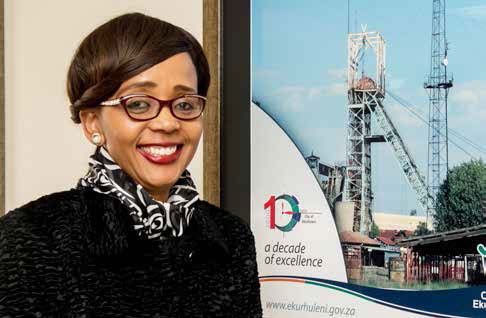 Ganda is the Group Chief Financial Officer (GCEO) of the Ekurhuleni Metropolitan Municipality (EMM) and it was only under her watch that the municipality received a clean audit from the Auditor General (AG) for the 2013/2014 financial year.
Ganda is the Group Chief Financial Officer (GCEO) of the Ekurhuleni Metropolitan Municipality (EMM) and it was only under her watch that the municipality received a clean audit from the Auditor General (AG) for the 2013/2014 financial year.
Introducing an automated system
Ganda said that in an effort to speed up the registration of service providers on the EMM’s database it is planning to introduce an automated system that will eliminate papers exchanging hands and shorten the time it takes for a service provider to be registered.
“One of the things that we are going to implement is a new automated system that will eliminate a lot of manual interference.
“We want people to register remotely so that no one can claim that their file has gone missing.”
She added that in future tenders and bids for jobs in the municipality will be adjudicated publicly.
“We are working on the modalities of opening up bids and adjudicating them in front of the public.
Training employees
Ganda said one of the important tools that helped the municipality to achieve a clean audit was the training that the municipality provided to its employees.
It targeted employees in management, supply chain practitioners and project management. The training, said Ganda, focused on the workflow and how the municipality should run its affairs.
“We went into the basics of how we do things, for example, when someone gets appointed as head of water service, we teach them how to do supply chain in Ekurhuleni and we teach them how to move from point A to point B.”
She said the training also included the EMM’s policies.
“It helped us to eliminate mistakes because all of our managers were familiar with our policies.”
She added that the human resources department wrote a manual that helps new employees learn how things are done in the municipality.
Ganda’s advice to CFOs is that they should strive to share information with other CFOs, develop your team, respect the law and internal processes of the institution and have regular interactions with rate payers and citizens.
What is a CFO?
The CFO has the important function of helping the accounting officer of a municipality, provincial and national departments to carry out their financial management responsibilities, including budget preparation, financial reporting and the development and maintenance of internal control policies and procedures.
The CFO has to provide good governance, effective oversight and address operational matters that constitute sound financial management.
Build on your education and training
If you are school learner you must do Mathematics and Accounting. At tertiary you will need to do a degree in accounting (preferably public accounting), finance, economics, business or a related subject. Many CFOs start their careers as finance professionals, accountants or managers of small divisions, and work their way up to senior positions within a company.
Manufacturing of set-top boxes underway
Manufacturing of set-top boxes underway Estelle GreeffThe process of manufacturing the five million set-top boxes (STBs) which government will distribute to poorer households is underway.
Digital Terrestrial Television (DTT) programme manager Dr Fhatuwani Mutuvhi said the process was underway following the appointment of manufacturers by the Universal Service and Access Agency of South Africa (USAASA).
“The South African Post Office will start with the registration process of poor tv-owning households in the Northern Cape in October and this will be followed by the registration in the border-lying areas across the country including Skelpadnest in Thabazimbi,” said Mutuvhi.
Mutuvhi was speaking at a DTT community outreach programme and Imbizo in Thabazimbi, Limpopo led by Communications Minister Faith Muthambi.
Digital migration refers to the switch from an analogue broadcasting system to a digital broadcasting system.
To be able to view digital television signals on an ordinary analogue television set, consumers will need a STB. The purpose of the STBs is to convert the digital signal for reception on an ordinary analogue television set.
If consumers have not bought a set-top box by the time the country switches to digital broadcasting, they will no longer be able to view the existing terrestrial television broadcasting services.
The Minister visited the area to raise awareness about the DTT programme.
Minister Muthambi told residents she would escalate their service delivery grievances to the relevant government departments.
Sinethemba Victor Booi, who is from the Eastern Cape and works at the Anglo-Platinum mine, told Vuk’uzenzele he was not aware of the country’s move towards digital broadcasting. He hoped government would also work on bringing water and sanitation services to the area.
“We really thank the department for coming and educating us about digital migration.”
Phethang Ntjana said he believed it would create jobs for himself and other unemployed residents. “It’s good when government leaders come to educate us about all these new developments.”
New school brings hope to Mvezo
New school brings hope to Mvezo Estelle GreeffGrowing up in the hilly village of Mvezo – about 40km south of Mthatha in the Eastern Cape, Mathabo Mbewu, 29, was forced to drop out of school only after a few months at primary because of the long distance she had to travel. The only school close to her was 20km away.
 She was only nine years old when she left school and that meant the end of education for her. She is not the only one. Many of the children in rural areas like Mvezo are either forced to drop out of school or have to travel long distances to access better school. But thanks to a new state-of-the-art modern school that has been built in Mvezo, Mbewu’s eight-year-old daughter will not have to go through the same difficulty as her mom.
She was only nine years old when she left school and that meant the end of education for her. She is not the only one. Many of the children in rural areas like Mvezo are either forced to drop out of school or have to travel long distances to access better school. But thanks to a new state-of-the-art modern school that has been built in Mvezo, Mbewu’s eight-year-old daughter will not have to go through the same difficulty as her mom.
The new Makgatho Lewanika Mandela Primary School will give her all she needs in a school. The school was opened by President Jacob Zuma recently and has all the technology and facilities required of a modern school.
“I am very happy that my child will be able to go to a good school and become a better person that I could not become. I know the education she will receive from that school will help her to be what she wants to be later in life and in turn she can help the community as a whole,” said Mbewu, who married the father of her three children at the age of 19.
“I know that things were difficult for me and I had to make the choices I made, but it should not be the same for my children. They should have a better chance than I had,” she said.
There was excitement in the tiny village as President Zuma handed over the R30 million school to the community during a ceremony attended by Basic Education Minister Angie Motshekga, Miss World Rolene Strauss, diplomats and representatives from the Eastern Cape provincial government, led by Premier Phumulo Masualle.
400 learners attend new school
More than 400 pupils will now have access to a new computer centre fitted with 42 computers, a library, a laboratory, administration block and a kitchen. The school was formed by the merging of the Nkwenkwezi Primary and Mvezo Junior Primary Schools.
Government, through the Accelerated School Infrastructure Development Initiative (Asidi), has delivered over 370 new schools replacing mud schools and other unsuitable structures around the country. Most of these schools were built in the Eastern Cape.
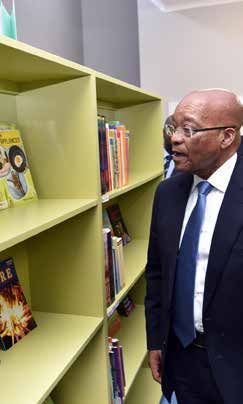 President Zuma said with the new school in Mvezo, children in the village will never suffer again.
President Zuma said with the new school in Mvezo, children in the village will never suffer again.
“We expect the next generation of Mvezo children to take up their rightful place in commerce, academia, leadership and the advancement of human rights and dignity.
“We are indeed honoured to walk in the shadow of a giant that was Madiba. We owe to him and his generation an immense debt of gratitude for sacrificing life and limb in pursuance of our liberty,” he said.
The President added that education remained a priority of government.
“We are happy therefore that there is a huge increase in the enrolment of children in school, from pre-primary to tertiary level. The number of children attending Grade R has more than doubled, moving from about 300 000 to more than 700 000 between 2003 and 2011.”
Eight million learners attend no-fee schools
Eight million learners were attending no-fee schools, whereas nine million learners are getting nutritious meals at school, which are provided by government to ensure that they do not suffer from starvation and that enables them to perform well.
“The matric pass rate has gone up from around 61 per cent in 2009 to 78 per cent last year and the bachelor passes improve each year,” President Zuma said.
Local chief Inkosi Zwelivelile Mandela said the Makgatho Lewanika Mandela Primary School was a tribute to the late Mandela, whose wish was for a modern school to be built in Mvezo. The former President was born in Mvezo and spent part of his childhood in the small village.
“My grandfather said let us use education to change the world and this is what we are doing here today. Education is still the only weapon we can use to change the world for the better,” said Chief Mandela.
Coega partners with Govt to improve school infrastructure
Coega partners with Govt to improve school infrastructure Estelle GreeffSchool infrastructure in the Eastern Cape Province is undergoing dramatic changes thanks to the Department of Education (DoE) and Department of Basic Education’s (DBE) commitment to improve teaching and learning environments. This is in line with government’s plan to eradicate mud structures in the province.
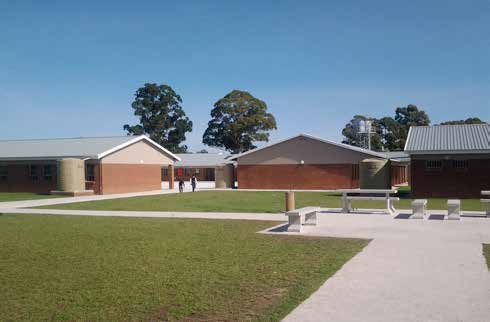 The Coega Development Corporation (CDC) has been appointed by the provincial DoE to assist with rolling out Eastern Cape Infrastructure School Building Programmes. These include the construction of 25 schools, 20 of which had been successfully delivered by July this year. In addition, water and sanitation programmes will improve 110 schools across the province that were identified as requiring work.
The Coega Development Corporation (CDC) has been appointed by the provincial DoE to assist with rolling out Eastern Cape Infrastructure School Building Programmes. These include the construction of 25 schools, 20 of which had been successfully delivered by July this year. In addition, water and sanitation programmes will improve 110 schools across the province that were identified as requiring work.
“During the 2015/16 financial year the CDC will build 71 schools in predominantly rural areas on behalf of the DoE, thereby boosting the quality of education for more than 42 500 children whose lessons have, until now, taken place in inappropriate structures,” said Thembeka Poswa, CDC’s DoE and Department of Sport, Recreation, Arts and Culture (DSRAC) programme director.
The Eastern Cape projects also include the completion of DBE projects, such as Nomzamo Madikizela Mandela/Thornhill Primary School in Thornhill, Port Elizabeth, valued at more than R27-million, and Nkanti Senior Primary School in Ntabankulu in the OR Tambo District, valued at more than R17 million.
Construction of Mayibenye Junior Secondary School in Libode, estimated at R21,5-million, was completed in August. The work at the Eastern Cape schools includes the building of administration blocks, Grade R classrooms, ablution blocks, multi-purpose classrooms, nutrition and dining centres, science laboratories, media centres, fencing, electrical installation and external works.
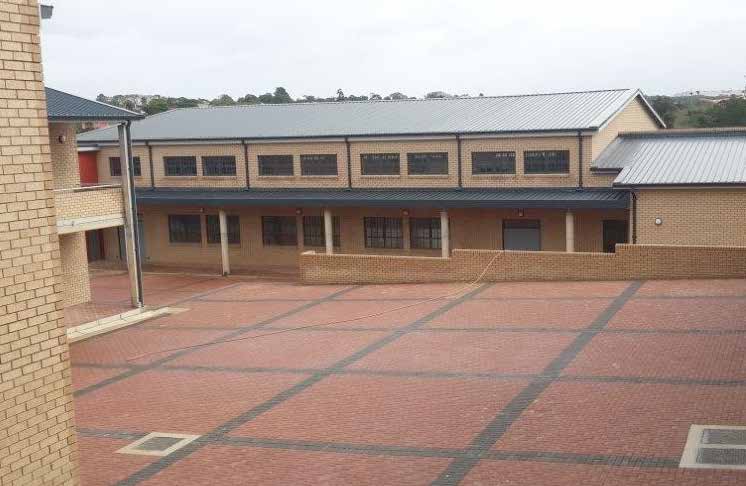 The upgrading of other DBE projects include five existing primary schools: Andrieskraal in Patensie, Dumezweni and Mbombo in Qumbu, Madlalisa in Mt Frere and Amamfengu/Clarkson in Kareedouw (Koukama Municipality).
The upgrading of other DBE projects include five existing primary schools: Andrieskraal in Patensie, Dumezweni and Mbombo in Qumbu, Madlalisa in Mt Frere and Amamfengu/Clarkson in Kareedouw (Koukama Municipality).
“Nomzamo Madikizela Mandela/ Thornhill Primary School in Thornhill and Nkanti Senior Primary School created work for nearly 200 people, with some also gaining skills such as health and safety, work ethics, excavation training, Personal protective equipment (PPE) training, technical training, and financial and life skills,” said Mbulelo Jokazi, CDC DoE unit programme manager. “The learners will enjoy the remainder of this school year in their newly-built schools.”
Mandla Makupula, MPL and MEC for Education said during his 2015/16 budget and policy speech, that the budget allocation increased significantly from R1.23bn to R1.82bn, and the Department was ready to roll-out the infrastructure programme. The coverage framework largely focuses on: providing and improving basic services at schools, especially sanitation; replacing mud structures at schools; rehabilitating, renovating and maintenance (particularly disasters); building ECD centres; facilitating and accommodating the re-alignment of schools.
*Supplied by The Coega Development Corporation
Cotton project set to transform rural community
Cotton project set to transform rural community Estelle GreeffThe lives of residents of Jozini, KwaZulu-Natal (KZN), have changed for the better since the re-opening of Makhathini Gin cotton project. The Makhathini Cotton Farm was bought by the National Department of Agriculture Fisheries and Forestry (DAFF) and the KZN Department of Agriculture and Rural Development.
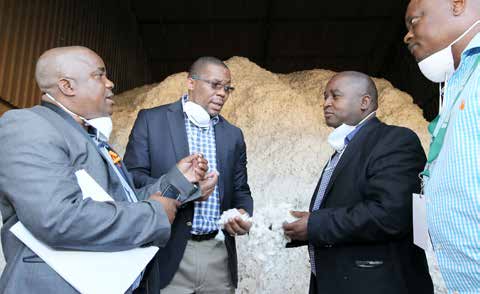 It was bought as part of government’s Comprehensive Rural Development Programme (CRDP), that aims to tackle issues such as underdevelopment, food security, unemployment, poverty and other social ills in rural areas.
It was bought as part of government’s Comprehensive Rural Development Programme (CRDP), that aims to tackle issues such as underdevelopment, food security, unemployment, poverty and other social ills in rural areas.
In the 2014/2015 financial year the KZN Department of Agriculture and Rural Development (DARD) spent more than R1.4 million in support of Makhathini Gin cotton project in Makhathini area.
During a recent visit to the project, MEC Cyril Xaba, who was accompanied by Deputy Minister for Rural Development and Land Reform Mcebisi Skwatsha, said the aim was to grow the farming sector so that it could help grow the economy and create jobs in the province.
“This initiative aims to enhance cotton production by small holder farmers in the Makhathini region to enable them to become sustainable producers of quality cotton and become involved additional phases of the value chain. This will also apply to the on-going job creation potential of the project related to continuous cotton production to feed the entire value chain via the Makhathini Gin,” he said.
Deputy Minister Skwatsha said since the start of the project more than 30 farmers associations with 1 579 farmers from the area were benefiting from it.
“Farmers were selected by Ubongwa Farmers’ Cooperative based on their skills that would be beneficial to Makhathini Gin cotton project.
“This will result in farmers being involved in more stages of the value chain of cotton processing. They will also be responsible for the marketing of the cotton processed through the Gin and have already negotiated contracts with spinners. Their intention is to take responsibility for their own cotton from production until processed into garments for the retail industry,” he said.
Matozi Simelane, chairperson for the farmers, said more than 590 seasonal jobs were created by the gin during the 2014/2015 financial year.
“The project had 17 people being employed full-time at the gin for the period of 15 months, three vacancies have been created for the mentoring and training through LIMA, 11 jobs have been created for security farm guards, 23 jobs for erecting the fencing of Ikhwehle, one for safety officer, and three extension staff,” she said.
More than 577 famers who are part of 2014/15 beneficiaries are currently busy with the cotton harvesting. This has made a difference to many households in the area.
“During planting and harvesting season, we employ more temporary workers of which will help generate revenue for some households around the area. Last year alone we managed to get just over R3 million during the sale of cotton in the Gin. We hope that as from next year we will double our sales as we are in the process of getting 2 500 hectares of land that will produce cotton around Makhathini. We also try by all means to put more women under our association.”
She added that there were currently 33 per cent male farmers (525), while 59 per cent were female (938) and 8 per cent (129) youth,” Simelane said.
Deputy Minister Skwatsha said people in rural areas deserve a better quality of life.
“Through the implementation of the Comprehensive Rural Development Programme we are beginning to see a transformation of the rural landscape of our country and the improvement in the livelihoods of rural communities. We hope that the people of Jozini will hold hands together with Ubongwa to ensure that this project is sustainable,” said the Deputy Minister.
Unemployed student takes control of his future
Unemployed student takes control of his future Estelle GreeffWhen Tsatsanape Mdluli dropped out of college because of a lack of finances, he also gave up on his dream of becoming a logistics manager.
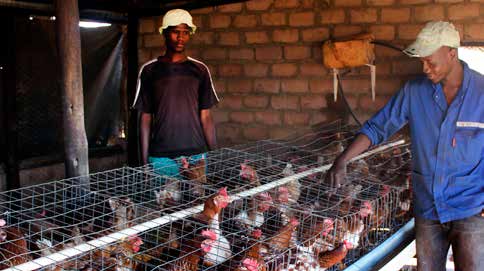 For over a year the 24-year-old was idle in Soweto and spent time with the wrong people, who almost lured him into criminal activities.
For over a year the 24-year-old was idle in Soweto and spent time with the wrong people, who almost lured him into criminal activities.
“It was very tough at the time. I would wake up and just go up and down the streets. I felt useless. I was getting frustrated because I was just sitting around doing nothing.”
Mdluli dropped out of City Town College in Soweto in 2010 because he did not have money to study for the second year of his Diploma in Transport and Logistics Management.
In 2010 and for most of 2011, he sat at home. Then he decided to change his life and go back to his home village of Ngwaritsi in Limpopo to work on a farm owned by his family.
Mdluli said the decision to get into farming was not a difficult one because he grew up on a farm and he was familiar with farm life.
“Farming is something that we’ve done as a family for a long time and I was born on this farm,” he said pointing to a farmhouse adjacent to a plantation of peaches.
In 2012, he decided to get into mixed farming, which is the practice of planting vegetables and farming livestock at the same time. He farms chickens, cabbages and peaches on the 10 hectare farm.
Mdluli was helped by the Limpopo Department of Agriculture through a programme called Fetsa Tlala that aims to eradicate poverty in poor rural communities.
The programme helped him to buy 200 broilers and chicken feed. Broilers are chickens that are bred and raised specifically for meat production.
His chickens produce in the region of 190 to 200 eggs per day. He packages at least 21 boxes of eggs per week. The packaged eggs are then sold to the community, neighbouring villages and local businesses.
Mdluli’s advice to young and upcoming farmers is to be patient.
“The farming business is not as simple as it looks and you must have patience because you can’t start now and make money tomorrow, it’s a long process that requires patience and a love for farming.”
He said he has big dreams and plans for his farming business.
“In the next two years we will be the biggest supplier of eggs in Ngwaritsi and the whole of Makhuduthamaga Local Municipality,” said Mdluli.
Govt connects with citizens
Govt connects with citizens Estelle GreeffYou can now access government information anywhere, anytime thanks to a mobile app for the South African Government website.
The South African Government app links users to the mobile friendly government website: www.gov.za and can be accessed on any cellphone.
 View:
View:
- The latest available jobs in the public service
- News and radio bulletins
- Upcoming events
- The latest speeches & statements
- Tenders
- Information on services like renewing your driver’s licence or car licence disc.
- Contact details of all government departments across all spheres of government, and more.
Download the free app now!
EPWP empowers women in KZN
EPWP empowers women in KZN Estelle GreeffMore than 40 000 women in KwaZulu-Natal are now able to provide for their families through Zibambele Road Maintenance Programme thanks to the Department of Public Work in association with KwaZulu-Natal Department of Transport.
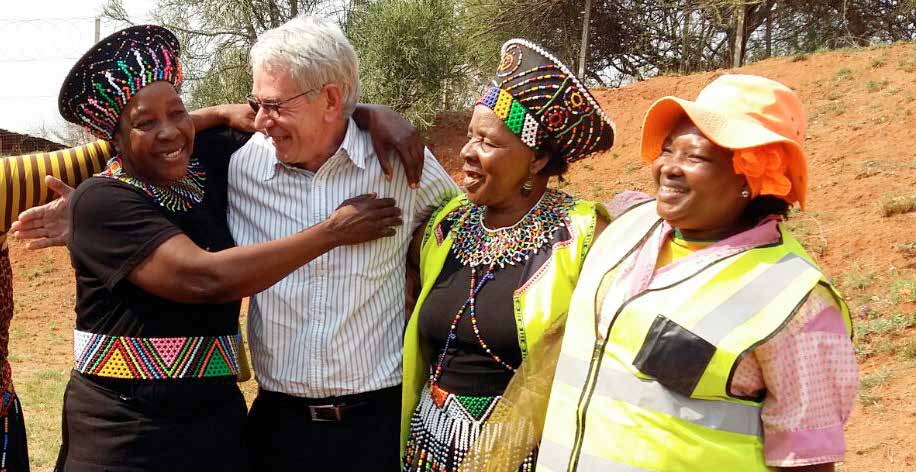 Zibambele is a poverty alleviation programme for previously disadvantaged individuals under the Extended Public Works Programme (EPWP) of the Department of Public Works.
Zibambele is a poverty alleviation programme for previously disadvantaged individuals under the Extended Public Works Programme (EPWP) of the Department of Public Works.
The programme was introduced with the aim of creating meaningful and sustainable job opportunities while at the same time maintaining low volume roads in the rural areas.
Zibambele participants come from four regions in which the KZN Department of Transport operates namely, Empangeni, Ladysmith, Pietermaritzburg and Durban. The participants’ duties include cleaning of road surface, clearing of drains and channels as well as clearing and cleaning of verges. Zibambele contractors carry out low-intensity road maintenance activities on the part- time basis on defined sections of the road network.
Department of Transport Senior Development Manager Thandeka Mbonambi told Vuk’uzenzele that the programme participants, who come from the most needy households, were nominated by their community. She said all of the contractors were trained on road maintenance and safety.
“Contractors’ safety comes first. Since the programme started in 1999 none of them have been injured on duty or hit by a vehicle while working because they are trained in safety,” she said.
Zibambele contractors receive ministerial determined wage of R75.10 a day and work for eight days in each month.
One of the EPWP participants Rose Nyathikazi, 48, said through Zibambele she has been able to educate her two children up to matric level.
“We appeal to our government to increase the number of days we work so that the money will increase,” she said.
Another beneficiary of the programme, Senzeni Mhlongo, 52, said she used to struggle before she became part of the programme.
“I am a widow and have a responsibility as a mother to provide basic needs to my family. Before this job I could not sustain my family. At least I am now able to take care of my family,” she said.
Public Works Deputy Minister Jeremy Cronin, who visited the Zibambele Road Maintanance workers in Inanda recently, said it was encouraging to see the project growing from strength to strength.
“The Zibambele Road Maintenance Programme offers the most sustainable work opportunities which play a vital role in alleviating poverty and creating social cohesion. The Department of Public Works is committed to the continued implementation of the programme,” Deputy Minister said.
Former teacher makes a mark in security industry
Former teacher makes a mark in security industry Estelle GreeffAfter realising that she was in the wrong profession, Lungy Mthembu decided to quit her job and find something she was passionate about. Mthembu, who worked as a teacher, joined her ex-husband’s security company and used the time there to learn about the industry and gain experience.
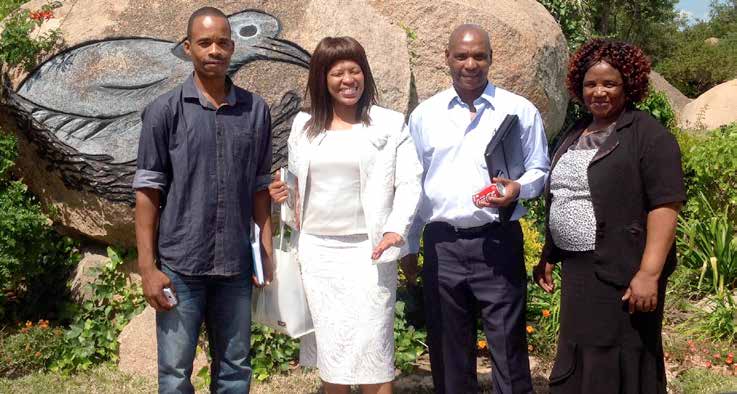 Once she had all the necessary experience she resigned to start her own business, Bulldog Security Services, based in Durban, in 2003.
Once she had all the necessary experience she resigned to start her own business, Bulldog Security Services, based in Durban, in 2003.
The company specialises in training security officers and provides security services to companies. Mthembu’s business trains security officers in grades E, D, C, B, and A. It also offers courses in cash-in-transit, guarding of special events and armed reaction response.
Mthembu said in the beginning the company secured contracts, however, these were not enough to sustain the business. In 2005 she approached the Small Enterprise Development Agency (Seda) for help and her business became part of the Seda incubation programme.
“Seda helped to market my business to private companies and [taught me] bookkeeping skills. The business has grown. I have employed 68 permanent security personnel and I get contracts outside of Johannesburg.
As the company expanded, Mthembu had to find new office space.
“Seda accommodated me in their space with a huge parking zone for company cars. I am saving a lot when it comes to rent because here I’m only paying 10 per cent of what I used to pay in that small premises previously,” she said.
Mthembu added that her business was in the final stages of getting the ISO 9001 rating which would enable her to get contracts from big retail stores. One of the challenges Mthembu faces is working in an industry dominated by men, but says she has overcome this.
“When companies see that this is a woman’s company they lose trust but I just had to persevere,” said Mthembu.
She added that future plans for the business include becoming one of the major security companies in South Africa that offers a world-class security service.
“I want this company to continue even if I’m gone, that is why I’m busy grooming my workers not just to be workers but to be in the driver’s seat as well,” she said.
What is ISO 9001?
ISO 9001 is one of the standards within the range of ISO 9000 standards.
ISO 9001 is the title of a document (Standard) that outlines the requirements an organisation must maintain in their quality system for ISO 9001 certification.
Meeting the requirements of this standard provide quality management systems that benefit an organisation to help manage business effectively and put in place best practice methodology.
ISO 9001 Certification gives an organisation the quality systems that will provide the foundation for better customer satisfaction, staff motivation and continual improvement.
Sources: http://www.iso9001.com and http://the9000store.com/what-is-iso-9001.aspx
Taking action, inspiring change in Ivory Park
Taking action, inspiring change in Ivory Park Estelle GreeffIvory Park, situated on the east, midway between Johannesburg and Pretoria once epitomised hopelessness and despair. But the township is steadily turning its fortunes around thanks to various initiatives from both government and non-governmental organisations.
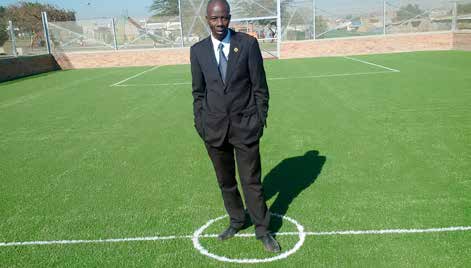 Petrus Zitha, a resident of the township, seems destined to make a difference to the community of Ivory Park still grappling with challenges of poverty, lack of certain services and housing shortage.
Petrus Zitha, a resident of the township, seems destined to make a difference to the community of Ivory Park still grappling with challenges of poverty, lack of certain services and housing shortage.
For many years, Zitha has experienced first-hand the vibrancy, challenges and complexity of social and entrepreneurial life in the streets of this township in his capacity as a city councillor in the area, which falls under the City of Johannesburg's Ward 79 in Region A.
Today, his dream of bringing change to the community seems more possible and under his leadership the community has seen major progress in the delivery of housing, formal stands with titled deeds, tarred roads and provision of electricity, proper sanitation and infrastructure, schools, a police station, libraries and a community centre.
Vuk’uzenzele recently spoke to him about what it means to serve this community as a councillor and what keeps him going despite the odds.
“To become a counsellor in an area that is underdeveloped in informal settlements like Ivory Park is not easy. It has been a long and learning curve for me but coming from a poor background myself, I understand the challenges being faced by the people better,” said the soft-spoken, Zitha from Tembisa, in Ekurhuleni. He moved to Ivory Park during the 1990s in search of better opportunities.
Ward councillors play a central role in the communication process between the communities they represent and the city council. Among other roles, they report back regularly through ward meetings and assist the community in identifying needs and priority areas of development, which feeds into the municipality's planning processes.
Among the challenges that many councillors face include addressing the apartheid-legacy underdevelopment of the regions and municipalities they serve, foster participatory governance at the local level, and consolidate local government to facilitate sustainable development and improving service delivery.
“Seeing the township developing and me being part and parcel of the process of this development really motivates me,” says Zitha.
The 51-year-old father of four Zitha stands out from the crowd and has taken full responsibility for his job and does it diligently.
Hands on approach
He is a man who practices simplicity and has a hands on approach. He never minces his words nor is he too busy to listen to the calls of his community.
“If I still see our people in shacks, unemployed that motivates me to say this is not what we fought for. We fought for all of us to enjoy the fruits of the Freedom Charter which says the wealth beneath our soil should be enjoyed by everyone, people should have housing and better education,” he says.
He refuses to label his efforts as a job but opting for rather a “calling.”
“It needs one to have a heart and patience to work with people. You become a doctor, a nurse, a social worker, you become a brother and a mother – you become all these things and on top of it you do not have a clock in or knock off time - it’s a 24-hour job with no leave."
Never too busy for the community
Zitha says he is never too busy to talk to his community as though they were relatives and with a supportive wife - who allows people into their house no matter the time of the day - his job is easy.
“The entire community becomes your family. I have seen in other wards that councillors had to be protected by bodyguards and their houses monitored - I rejected that my bodyguard is the community of Ivory Park and have assured me that nothing will happen to me.”
He confidently declares that people in this ward are happy with the delivery of services, although sometimes delivery turns out to be slow.
As a sign of approval, he has won several awards from various organisations, from the business sector, the churches, schools and youth organisations.
“I do my work unaware that I would get a compliment from the local community it is very humbling and shows that everyone is watching my work.”
However, Zitha is not naive and acknowledges that not everyone is happy by his efforts in the community.
“Others offer criticism which I like because they make me do my work diligently and keep me on my toes. I do not allow myself to be praised all the time as they make one to relax,” he said.
Zitha said the issues that keep him awake at night are the mushrooming informal settlements, unemployment which he says stands at about 67 per cent, lack of youth recreational facilities and lack of public transport like buses as well as high crime levels.
But despite all these challenges - he said the spirit in the community is never down as most of them supplement their livelihoods through informal trading.
By being a counsellor and putting his community first - Zitha is an example of ordinary people around the world who have taken up the responsibility for making the world a better place, one small step at a time.
TYPES OF COUNCILLORS
- A ward councillor is responsible for the interests of people in a specific ward are represented in council. He/she reports on council activities on a regular basis to the ward and reports on annual performance of the ward and strengthen the relationship with community.
- A proportional representative councillor is a member of a political party and is elected through the party lists. He/she is accountable to the party.
- An independent councillor does not belong to a political party and is accountable to the people who have elected him/her to represent their interests.
WHO IS MY COUNCILLOR?
It’s important for you to know your councillor for you to know who to go to with your issues.
Get the contact details of your Ward Councillor by sending your ID number to 32245 (R1 per SMS sent or received)
KZN Agri-parks get R450m
KZN Agri-parks get R450m Estelle GreeffGovernment has set aside R450 million for the establishment of Agri-parks in KwaZulu-Natal out of a total budget of R2 billion for the national roll out.
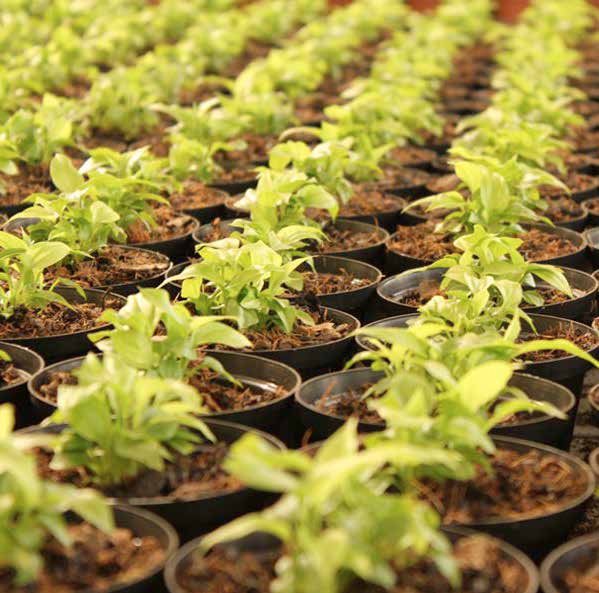 Ten sites have been identified for the establishment of Agri-parks which are at different stages of development, announced Minister of Rural Development and Land Reform Minister Gugile Nkwinti.
Ten sites have been identified for the establishment of Agri-parks which are at different stages of development, announced Minister of Rural Development and Land Reform Minister Gugile Nkwinti.
“Each district has been reviewed and commodity options have been selected, which takes into account land capacity, what is actually farmed in the area and which commodity is more likely to assist with the set objectives of increased production.”
The government’s definition of an Agri-park is a farmer-controlled entity that serves as a catalyst around which rural industrialisation is planned to take place.
The aim is for the park to provide a network of contacts between producers, markets and processors, as well as infrastructure to process agricultural products.
Minister Nkwinti said government will support Agri-parks for a period of ten years to ensure economic sustainability after which it is expected that farmers will take complete control.
A working group of all relevant government departments has already been established to deal with all regulatory requirements pertaining to Agri-parks such as environmental impact assessments.
South Africa currently has Agri-parks in all 44 districts across the country.
According to the Minister, significant progress has been made in the roll out of the Agri-Parks which are expected to create 90 000 jobs in the value addition activities linked with the various Agri-park components.
This excludes the contribution that will be made towards the establishment of 300 000 smallholder farmers.
“Of critical importance to the success of all Agri-parks are production plans, market linkages and skills development which we plan on completing within the next three to six months,” said Minister Nkwinti.
The Minister added that his department is working with the National Department of Agriculture, Forestry and Fisheries and the Provincial Department of Agriculture and Rural Development to ensure production plans already submitted for all provinces, are implemented to coincide with the coming planting season, and jointly the department was working tirelessly to ensure that farmers are supported.
Road projects empower women
Road projects empower women Estelle GreeffSix women in the Chris Hani District Municipality have created work for unemployed local community members through the construction of 15 kilometres of pedestrian walkways in the remote semi-rural town of Whittlesea.
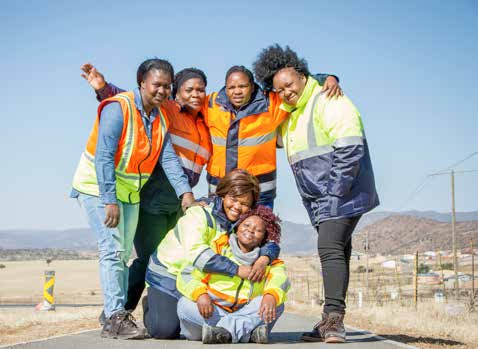 The South African National Roads Agency Ltd (SANRAL) started construction in March this year and completed in September. The project formed part of SANRAL’s community development initiative.
The South African National Roads Agency Ltd (SANRAL) started construction in March this year and completed in September. The project formed part of SANRAL’s community development initiative.
“It is interesting to see how this project is influencing change and development in the lives of individual SMMEs and their employees. Eighty-five general workers are employed by these SMMEs. The majority of them hadn’t been involved in civil engineering construction before,” said Lindelani Tsanwani, SANRAL Southern Region project manager.
The process involved adverts and clarification meetings between July and August 2014, after which prequalification assessments were conducted and 30 NQF Level 2 and 16 NQF Level 4 learners were selected to start training in September to November 2014.
“The training has included business skills, communication and financial skills. They are able to purchase their own material and have forged good relationships with local suppliers of aggregates, bitumen and plant equipment, which will assist them in future contracts,” Tsanwani said.
Ncumisa Simayile, owner of Ncurals Trading, is not only making a difference in her own life but also in the lives of fellow community members.
“When my employees tell me how happy they are to work and afford to put food on the table it makes me cry,” said an emotional Simayile.
Before working on the SANRAL project, Simayile, a single mother of two children, survived by occasionally selling vegetables and goats as well as relying on her children’s child grant money.
Feni Masala, a mother of two girls aged 13 and 9, used to own a catering business before she started her business.
“It was difficult to pay school fees, debt was piling up and we struggled to provide for our children.
“When I started working on the SANRAL project, not only could I settle our debt and provide better for our children, but also help others who were in the same situation as me,” she said.
Safer, reliable transport for commuters
Safer, reliable transport for commuters Estelle GreeffAs the country celebrates Transport Month, passengers in Mamelodi east of Pretoria are benefiting from an improved bus service as a result of the introduction of Autopax Bus Service in the township.
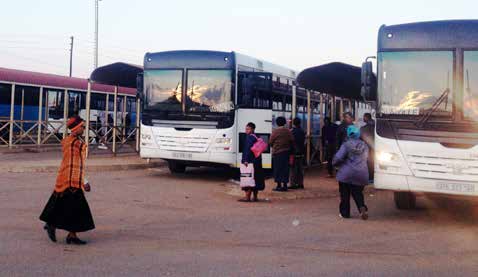 Autopax Passenger Services (SOC) Limited, is a subsidiary of the Passenger Rail Agency of South Africa (PRASA) and operates three state-of-the-art bus services, the luxury service (Translux), semi luxury service brand (City to City) and special hire service brand (Autopax Charters utilizing City to City and Translux Buses)
Autopax Passenger Services (SOC) Limited, is a subsidiary of the Passenger Rail Agency of South Africa (PRASA) and operates three state-of-the-art bus services, the luxury service (Translux), semi luxury service brand (City to City) and special hire service brand (Autopax Charters utilizing City to City and Translux Buses)
Currently, Autopax has a fleet of over 555 buses that provides safe and reliable feeder and distribution services to cities and municipalities in rural areas.
Recently, Autopax took over routes that were operated by private company Public Utility Transport Corporation (Putco) in Mamelodi, Vosloorus (East Rand) and Evaton (Vaal).
One of the many commuters benefiting from the service is 29-yearl-old Matlhodi Motsoko from Mamelodi Extension 5.
Motsoko used to spend over two hours on the road going to work, but thanks to Autopax buses she says it only takes her an hour to get to work.
Motsoko leaves the Mamelodi bus depot at 6h30 in the morning and arrives before 7h30 to start working at Queenswood, just outside the Pretoria City Centre.
“I used to get to work late almost every day, but since the new Autopax buses, the service has improved and I’ve never been late since I started using them.”
She said the buses are punctual, clean and reliable.
“We’ve never had a breakdown in the morning and even in the afternoon, these buses are in a good condition and are safer than the previous ones. The service is affordable. I’m able to save some money though it’s not much, but the little I’m able to save makes a difference.”
She added that she is now able to spend more time with her family because the buses are punctual.
As an added service, different buses go into parts of Mamelodi to pick up passengers and drop them off at the depot. Something that Motsoko said saves her time because it cuts the walking time from her house to the depot.
Though she is happy with the service, she says Autopax can improve on the ticketing service and install machines that print ticket as soon as the passenger pays.
Opportunities for youth in maritime
Opportunities for youth in maritime Estelle GreeffSouth Africa’s maritime has many opportunities, particularly for young people. Programmes such as Operation Phakisa Oceans Economy that aims to tap into the oceans potential to grow the economy and create jobs, will benefit the youth.
What is maritime?
Maritime refers to activities relating to the sea. The term that is generally taken from the two words, marine for water and time for social and economic activities taking place in the water environment.
South African Maritime Safety Authority
The South African Maritime Safety Authority (SAMSA), an agency of the Department of Transport, is responsible for ensuring the safety of life and property at sea, preventing pollution of the Marine Environment by Ships and championing South Africa’s Global Maritime Interests.
Youth programmes
SAMSA manages major youth programmes and projects that help stimulate the development of maritime sector in the country. These major youth programmes, funded by the National Skills Fund, include:
- The National Cadetship Programme (Training and finding berth for the Cadets in International Shipping Lines)
- Training On-Board SA Agulhas (Dedicated training vessel)
- Bursaries to high school learners and tertiary institutions students (Bursaries are offered to grade 9s to study their grades 10, 11, & 12 at Lawhill Maritime Centre in Simonstown, Cape Town; and for students in Cape University of Technology and Durban University of Technology to study Maritime Related Diplomas such as Marine Engineering, Maritime Studies, and Nautical Studies)
- The National Maritime Awareness Programme (a programme that aims to open up the maritime sector to the youth and the public by promoting the sector and the opportunities in maritime).
Intakes are done around April every year. Advertisements are placed in local and national newspapers.
Bursaries for Lawhill Maritime Centre are advertised in rural and selected public schools and are currently opened as they around the third quarter of very year. The same applies with the hopefuls for the tertiary institutions.
For more information on: Cadetship call: 012 366 2600; For bursaries call: 012 366 2600.
Stimulating youth interest in aviation
Stimulating youth interest in aviation Estelle GreeffThe aviation industry is one of the fastest growing industries in the world. It has been reported that by 2030 air traffic volume would increase by 50 percent. Although this is encouraging, the worry is that currently the aviation industry is dominated by a generation of individuals over the age of 40.
Poppy Khoza, the Director of Civil Aviation (an equivalent of CEO) at the South African Civil Aviation Authority (SACAA), said there are plans in place to introduce more people into the aviation industry.
“It is true that the aviation industry still lags behind in terms of transformation. Without a decisive intervention, this lethargic transformation pace will continue and be the legacy we leave behind for future generations. Having said that though, we have not lost hope and are in fact implementing various initiatives,” said Khoza.
One such initiative is the Joint Aviation Awareness Programme (JAAP), an initiative championed by the Department of Transport (DoT), that aims to provide previously disadvantaged youth with access to aviation awareness and career development.
JAAP visits over 400 schools across the country every year. In the process, over 10,000 learners, especially those who are in Grade 11 and 12 are introduced to various careers and opportunities in the aviation sector.
“We have noted that once we have sparked the youth’s interest in aviation, their chances of fulfilling their dreams are dashed by the lack of money. That is why SACAA introduced a bursary scheme to support these kids in their quests to enter the aviation industry.”
In the last financial year, the SACAA spent R2 million to train 27 young and aspiring aviators, the majority of which are females from economically depressed and rural households. The recipients of the funding are training towards becoming, among others, pilots, aircraft avionics technicians, aircraft maintenance engineers, aeronautical engineers.
The aviation sector is said to support approximately 227,000 jobs in South Africa with a contribution of contributed R74 billion to the country’s Gross Domestic Product (GDP).
“The aviation industry is a key driver of economic growth; and it is about time that women and the youth stake their claim in it,” Khoza concluded.
For more information visit: www.caa.co.za email: jaap@caa.co.za or jaap@dot.gov.za
New measures to keep SA roads safe
New measures to keep SA roads safe Estelle GreeffThe review of laws on the use of blue lights by private vehicles and the reintroduction of the dragger are amongst the measures to deal with drunken driving and the state of road safety in South Africa.
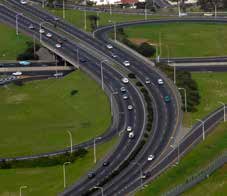 A dragger is an alcohol-screening device.
A dragger is an alcohol-screening device.
These measures were announced following the release of the State of Safety Report recently.
The report was presented to Transport Minister Dipuo Peters during the Annual General Meeting (AGM) of the Road Traffic Management Corporation (RTMC), in Boksburg.
The report highlighted bad behaviour and negative attitudes by road users. It identified alcohol abuse, dangerous overtaking, vehicle fitness as well as pedestrian negligence as five major causes to crashes over the past five months.
The report showed that during the five-month period, there were 10.3 million registered vehicles in the country with the majority of them in Gauteng, Western Cape and KwaZulu-Natal. However, the majority of crashes took place in Gauteng, KwaZulu-Natal, Eastern Cape, Mpumalanga and Limpopo.
Between April and August, the country witnessed 4 528 crashes resulting in 5 433 deaths. A high number of deaths occurred in the months of May and August, as compared to other months.
Minister Peters said during a media briefing that despite numerous legal challenges on the use of the dragger that leads to the use of it as illegal, the department had finally satisfied the legal requirements of the use of it.
“We will religiously ensure that the introduction and reinforcement of the dragger is rolled out throughout the country,” said Minister Peters.
Key to the requirements include that authorities have to buy the equipment and traffic officers must be trained on how to use the equipment.
“The NPA under the guidance from Adv Van der Vijver is in the process of developing guidelines to be used by prosecutions,” the Minister said, adding that the reintroduction of the dragger will be managed with extreme caution to avoid unsuccessful prosecutions.
Improving safety
In a bid to improve safety the AGM also decided that there should be heightened, integrated and targeted law enforcement operation in the top six corridors, which were identified as routes with the highest traffic volumes.
The top six corridors include N1 between Pretoria – Polokwane and Beitbridge, N2 between Somerset West and Cape Town, N3 between Johannesburg and Cape Town, N4 between Pretoria, Nelspruit and Lebombo, N1 between Mangaung and Cape Town as well as the R61 between Aberdeen and Beaufort West.
Other measures include periodic, integrated operations focussed on checking the roadworthiness of heavy vehicles, buses, taxis and scholar transport with fines of R50 000 imposed on impounded heavy vehicles and R15 000 for light vehicles.
“The laws authorising private vehicle testing centres should be reviewed with a view to clamping down on non-compliant private centres. There should be a dedicated attention to stray animals and interventions on fencing, provision of animal reflective belts and animal identification tags.
“There should be a review of regulation on the utilisation of blue lights by private vehicles. Mobile roadworthiness testing equipment should be deployed in all provinces and in rural areas to reduce risky un-roadworthy vehicles on the roads,” Minister Peters said.
Transport infrastructure
Transport infrastructure and services are important for economic development, job creation and social transformation. During the current MTSF period the Department of transport will:
- Oversee the establishment of a rolling stock factory in Ekhurleni,
- Upgrade the R573 Moloto road, roll out integrated public transport networks in thirteen cities.
- Renegotiate and improve air services agreements on the continent to facilitate mobility of goods and people, reform the port tariff structure to promote beneficiation
- Improve ship register and enhance cargo volumes, maintenance of provincial roads, development of private sector participation framework and infrastructure funding framework.
The upgrade of Moloto road will create about 10 000 job opportunities, and the rolling stock jobs are estimated at 65 000.
A further 7 900 jobs will be created from the integrated public transport network programme and another 61 00 jobs will ensue from the provincial road maintenance scheme.
Did you know?

 The Road Traffic Management Corporation (RTMC) plans to introduce a 24-hour shift for traffic officers to keep roads safe. The RTMC will work with provincial traffic authorities to strengthen law enforcement on the roads to help bring down the number of road accidents and deaths.
The Road Traffic Management Corporation (RTMC) plans to introduce a 24-hour shift for traffic officers to keep roads safe. The RTMC will work with provincial traffic authorities to strengthen law enforcement on the roads to help bring down the number of road accidents and deaths.
The cooperation also plans to deal with corrupt driving schools that work with licensing officers to issue drivers’ licenses illegally.
Traffic officers will also receive further training and development skills to enforce overload control, dangerous goods transportation, vehicle examination, license examination, road traffic information and road traffic legislation.
Road safety tips
Road safety tips Estelle Greeff South Africa celebrates Transport Month in October. Here are some tips from Vuk’uzenzele to help you stay safe on the road.
South Africa celebrates Transport Month in October. Here are some tips from Vuk’uzenzele to help you stay safe on the road.
- Obey the speed limit.
- Do not use your cellphone while driving.
- Do not drink and drive.
- Ensure that the vehicle is roadworthy and maintain a safe following distance.
- Always wear a seat belt, whether you are the driver or the passenger, even when travelling short distances.
- Parents and caregivers must always secure children properly to reduce the risk of injury and/or death in the event of a crash.
- Parents are advised to select a car seat based on their child’s age and size and to avoid travelling with a child on their lap.
- Young children and infants should never be left unattended in a car.
- Parents need to teach children safe traffic behaviour from an early age to keep them safe.
 Pedestrians should:
Pedestrians should:
- Wear bright colours at all times.
- Obey traffic signals.
- Cross at pedestrian crossings.
- Not drink and cross the road.
- Not cross where a road bends or leads to a sharp curve.
- Avoid wearing headsets and talking on the phone while crossing the road.
Cyclists should
- Motorcycles provide almost no protection in a crash, so it is advisable for motorcyclists to wear protective, visible and reflective clothing.
- Motorcyclists should also keep their headlights on, avoid other vehicles’ blind spots and be cautious of dangerous road conditions.
- Cyclists and motorists must be selfless and share the road safely. Cyclists have the same rights and responsibilities as drivers.
- Those using bicycles should make use of pedal cycle lanes where these are available and keep as close to the left edge of the road as possible.
- Cyclists should also obey the traffic signs and signals, use hand signals when turning or changing lanes, wear a helmet that fits properly and never ride with headphones on.
Source: Western Cape Department of Transport
On the road to better motoring in the EC
On the road to better motoring in the EC Estelle GreeffThe South African National Roads Agency’s (SANRAL) 32 roadwork construction projects in the Eastern Cape will change the quality of roads in the province.
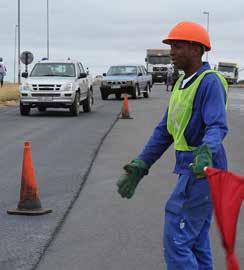 Major roadworks construction projects valued at R2.2 billion in the Eastern Cape are expected to improve the attractiveness of region for foreign and direct investment, creating safer and sufficient walkway and road-crossing infrastructure for pedestrians, and improving road surface.
Major roadworks construction projects valued at R2.2 billion in the Eastern Cape are expected to improve the attractiveness of region for foreign and direct investment, creating safer and sufficient walkway and road-crossing infrastructure for pedestrians, and improving road surface.
Vuk’uzenzele looks at some of the statistics and how it will benefit the region
- New data released by SANRAL Southern Region shows that 1 070 km or 23 per cent of the national road network of 4 544 km in Eastern Cape - the province with the most national roads - is being upgraded, preserved or rehabilitated and that the entire 4 544 km was being maintained throughout the year.
- In the Eastern Cape, SANRAL is busy on the N2, N6, R61, R63, R65 and R67 with a number of projects.
- R750 million is being spent on periodic maintenance covering 600 kilometres of the national road network.
- R372 million is for special maintenance over a distance of 208 kilometres.
- R460 million has been set aside for rehabilitation of the national road network covering 122 kilometres.
- R648 million is for special upgrading projects on 140 kilometres of the national road in the province.
- According to statistics released by SANRAL Southern Region, the value of conventional engineering and routine road maintenance contracts awarded to 625 SMMEs between April 2014 and March 2015 was R805 million.
- Majority of these of beneficiaries (69.76 per cent) were black-owned companies.
- The latest SANRAL project in the Eastern Cape is the special maintenance of a 28-kilometre stretch of the N2 road between Bramlin Interchange and the Coega IDZ in Port Elizabeth.
- The project entails resurfacing, drainage improvements and localised repairs of existing pavement failures over 18-month period.
- These projects will also improve safety of pedestrians through several special walkways, pedestrian bridges, and to protect the assets of rural livestock farmers and to reduce motor vehicle accidents several agricultural underpass culverts are being constructed.
- This year SANRAL is also expected to spend R179 million on community development projects in the Eastern Cape.
Parents forced to take responsibility
Parents forced to take responsibility Estelle GreeffPresident Jacob Zuma signed the Maintenance Amendment Act into law recently after it was passed by the National Council of Provinces.
The aim of the Act is to improve the maintenance system.
The Department of Justice said the amendment of the Maintenance Act 1998 (Act No. 99 of 1998) has been its major priority as it will ensure that parents take responsibility for the upbringing of their children.
“The new Act is part of a wider range of measures introduced by the Department to bring about real change in service delivery to maintenance beneficiaries and ensure access to justice for all, particularly children and women.
“As a department, we pride ourselves on the interventions that we continue to initiate in order to improve maintenance systems and ensure that children are taken care of,” said the department.
Among others, the act seeks to further regulate the lodging of the complaints relating to the maintenance and the jurisdiction of the maintenance courts, to investigate maintenance complaints and securing of witnesses for purposes of maintenance enquiry.
It will also further regulate maintenance enquiries in order to make a provision for the granting of the interim maintenance orders, to regulate the circumstances in which the maintenance orders may be granted by default and to grant of cost orders.
Further the Amendment Act states that if the person from whom maintenance is sought cannot be traced, the court can grant an order directing electronic communication service providers to provide the court with contact information.
This direction may only be used if the court is satisfied that all reasonable efforts to locate the person in question have failed.
In addition to this, if a person has defaulted on paying maintenance, their personal details will be submitted to all credit bureaus.
This will prevent maintenance defaulters from continuing to receive credit while owing maintenance.
What you need to know about child maintenance
What you need to know about child maintenance Estelle GreeffGovernment is working hard to improve maintenance systems and ensuring that parents take responsibility for the upbringing of their children.
Who should pay maintenance?
• It is a legal obligation of both the biological parents, grandparents or legal guardian of the child to pay maintenance.
Can I claim maintenance from grandparents?
• Yes maintenance can be claimed from the biological grandparent if the parents cannot pay maintenance.
Is maintenance a responsibility of biological parents only?
• No, any person who is responsible to raise the child i.e legal guardian, adoptive parents and grandparents of the child, if the biological parents do not have means to pay maintenance.
Why must you pay maintenance?
• You must pay maintenance for proper living and upbringing of the child, and includes the provision of food, clothing, accommodation, medical care and education.
Is it compulsory to pay maintenance?
• Yes, it is compulsory to pay maintenance.
How often should maintenance be paid?
• The maintenance money should be paid every month on the dates agreed upon by both the parties and granted by the court.
How much money should be paid for maintenance?
• The amount payable for maintenance will be determined by the needs of the child and the financial means of the parents.
At what age should you stop paying maintenance?
• The maintenance should be paid until the child is self-supporting.
What happens when the person responsible for paying child maintenance dies?
• The maintenance money should be paid out from the deceased estate for future maintenance.
What documents do I need to lodge a maintenance claim?
• The Identity document, birth certificate of the child, bank statements of both the parents, list of the expenses of the child, list of expenses of both the parents, etc.
Can I claim maintenance while living together with the father/mother of the child?
• Yes, you can claim maintenance if the other parent does not take responsibility of maintaining the child.
Can I go to any magistrate court in the country to lodge maintenance?
• Yes, you can go to any local magistrate court where you and/or the child reside.
Did you know?
If a person has defaulted on paying maintenance, their personal details will be submitted to all credit bureaus. This will prevent maintenance defaulters from continuing to receive credit while owing maintenance.
For more information contact your Regional Maintenance Complaints Manager:
Mpumalanga : Ngwenya Coleen
Tel : 013 947 2363
Email : CNgwenya@justice.gov.za
Limpopo : Ngwatla Kgomotsho
Tel : 015 287 2179
Email : KNgwatla@justice.gov.za
KwaZulu-Natal : Moodley Ryan
Tel :031 372 3165
Email : RyMoodley@justice.gov.za
North West : Mashilo Ramoroka
Tel : 018 397 7053
Email : MasRamoroka@justice.gov.za
Northern Cape: Morris Ivodia
Tel : 053 839 0000
Email : IMorris@justice.gov.za
Western Cape: Gaironisa Benjamin
Tel: 021 462 5471
Email : GBenjamin@justice.gov.za
Gauteng: Sithole Dzudzani
Tel : 011 332 9044
Email: DzSithole@justice.gov.za
Free State: Vungayi Ntombizanele
Tel: 051 407 1800
Email : NVungayi@justice.gov.za
Eastern Cape: Mokhibo Gwintsa
Tel: 043 702 7068
Email: MGwintsa@justice.gov.za
Restoring hope to families
Restoring hope to families Estelle GreeffSingle parenting can be a tough and challenging experience and the Department of Justice and Constitutional Development, through its Operation Isondlo, continues to ensure that those responsible for paying maintenance are obliged to do so for their children’s well-being.
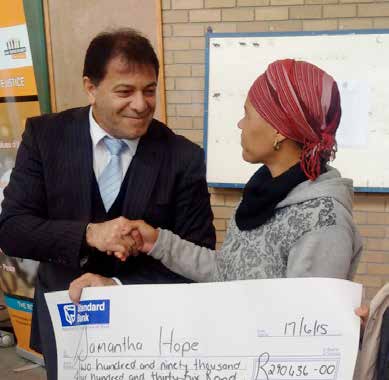 Western Cape mother, Samantha Hope (34) recently received a lump-sum settlement for maintenance. Hope, who is currently unemployed, raises her nine year-old son and her 11-year-old daughter, who suffers from Sturge-Weber Syndrome, a rare congenital neurological and skin disorder which affects the brain.
Western Cape mother, Samantha Hope (34) recently received a lump-sum settlement for maintenance. Hope, who is currently unemployed, raises her nine year-old son and her 11-year-old daughter, who suffers from Sturge-Weber Syndrome, a rare congenital neurological and skin disorder which affects the brain.
Hope received a R290 000 lump sum. From that, a stipend will be paid out to her, and her children monthly.
“I got married in 1996 and had two children. After realising that my marriage was not working out, my ex-husband and I divorced in 2009. After the divorce, and being unemployed, my huge concern was the future of my children, in particular my daughter, who has special needs,” she said. The divorce agreement legally stated that the children’s father would be responsible for maintenance.
“My ex-husband’s responsibility was to pay maintenance for my children. This meant that I would be responsible to ensure that my children’s needs such as education, aftercare, food and extra mural costs are met,” she explained.
After an agreement was signed, her ex-husband agreed to a maintenance payout of R1 700 a month for both children. The payments were met in the beginning, but earlier this year, he defaulted on paying maintenance without notice and she later learnt that her ex-husband had retired and was no longer working.
Hope began doing odd jobs to make ends meet, but this would not cover the costs of her daughter’s needs for basic essentials like nappies because of her condition After realising that the burden was too much to handle alone, she decided to approach the Wynburg Magistrate’s Courts’ maintenance section for assistance. “The officials at the court were very helpful, I completed the necessary forms for the court to proceed with the execution and the process was very quick,” she said with a smile.
In April 2015, the court found that Hope’s ex-husband had retired and an order to attach a lump sum of R290 000 from her ex-husband’s pension fund was issued. Her ex-husband subsequently complied with an order and the money was deducted from his account and transferred to the Guardian’s Fund in the Department of Justice and Constitutional Development.
Today, Hope and her children receive a monthly payout of R1 700 a month, which she describes as a blessing for the future of her children.
“I encourage all the single mothers out there battling to support themselves and their children to stand up and ask for help at any magistrate’s court.
The maintenance system is a lot easier as long as you have all the necessary documents at hand.”
* Glory Msungwa works for the Department of Justice and Constitutional Development.
SA company scores 150 million order in Angola
SA company scores 150 million order in Angola Estelle GreeffA South African company successfully attracted investment at the recently held Feira Internacional de Angola (FILDA) trade fair.
 According to the Department of Trade and Industry (dti), Weatherhaven Africa, which participated in the week-long trade fair, received orders amounting to more than R150 million.
According to the Department of Trade and Industry (dti), Weatherhaven Africa, which participated in the week-long trade fair, received orders amounting to more than R150 million.
Weatherhaven is one of the 24 South African companies that showcased their products and services at the fair.
Director of Central and West Africa at Weatherhaven, Serge Tonkeu, said the trade fair showed that opportunities were abundant across the Angolan economy.
The company received an order from the Angolan army to manufacture camp tents to house 1 500 army personnel, which amounts to R150 million.
Another order was from the Angolan prison services, for four kitchen containers amounting to R2.5 million and manufacturing of 6 000 special raincoats for prison warders to an amount of R1 million.
“I am confident that we will be able to deliver on these huge orders, and we are fully taking advantage of the numerous investment opportunities that the Angolan industry has presented to us,” said Tonkeu.
Tonkeu, who remained in Angola following the trade fair, said that the company held meetings with a mining company, an oil and gas company and Angolan Military Services, who all require camps tents for personnel based in remote areas.
Tonkeu added that these orders would in turn provide temporary employment for South Africans.
“As the orders come in, it means that our company will have to employ people to ensure speedy manufacturing and delivery to our clients, and that will be our small contribution towards alleviating unemployment,” added Tonkeu.
The South African companies who exhibited their wares at FILDA did so with the help of the dti.
Food security recognition award for SA
Food security recognition award for SA Estelle GreeffPresident Jacob Zuma has welcomed the Food Security Recognition Award for South Africa which has the Millennium Development Goal One hunger target.
South Africa is one of 72 countries that have reached the MDG hunger target that is, reducing by half the proportion of undernourishment between 1990 and 2015.
The country received this remarkable accolade from the Food and Agriculture Organisation of the United Nations, during the World Forestry Congress, that took place in Durban recently.
The award recognises and celebrates the country’s achievement in the fight against hunger.
"We are all very proud of this remarkable achievement and I congratulate all the South African people as we have achieved this through working together to promote food security,” said President Zuma.
The country is recognised and acknowledged with 11 other countries for keeping undernourishment levels below 5 percent.
Free State students to receive training in India
Free State students to receive training in India Estelle GreeffFifty students from the Free State have received a once in a once-in-a-life-time opportunity to be part of a six-month Information Communication Technology (ICT) training programme in India.
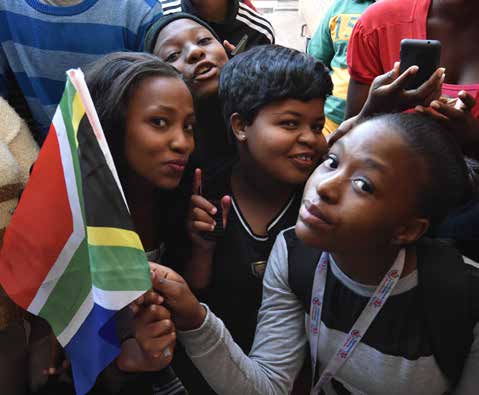 The Free State Provincial Government, in partnership with Tech Mahindra, sent 50 students from across the province to India recently.
The Free State Provincial Government, in partnership with Tech Mahindra, sent 50 students from across the province to India recently.
This brings the total number of students on the Tech Mahindra ICT programme in India to 100. The first group of students left in June this year.
Tech Mahindra is an Indian multinational provider of information technology, networking technology solutions and business support services to the telecommunications industry.
Last year a team from the Free State government visited Tech Mahindra in India and on their return expressed an interest in working with the company to help with skills of young people in ICT.
“Students were chosen from a shortlist provided by the Free State government. Those students had to go through an assessment before they were given the go-ahead to be part of the programme,” said Tech Mahindra’s Satish Chandra.
The students are made up of Grade 12 learners, college learners and those with basic ICT training.
The training programme will be provided with top-notch infrastructure available at Tech Mahindra, and will be handled by highly qualified professionals.
“I am very happy to get this opportunity of furthering my studies in India. This is a once-in-a-life-time opportunity and I promise the Free State Government to work hard and acquire the necessary skills that will assist in moving the Free State forward,” said Mapaseka Raputsoane, a resident of Botshabelo, who is part of the group.
Once the students complete the ICT programme, the Free State Provincial Government will help with placement of these students at various government departments and entities.
Tech Mahindra will also identify students who do well and put measures in place to absorb them at their satellite office in South Africa.
“It is important that we look into a well-coordinated approach of advancing issues of service delivery through reconfiguration of the current partisan approach to ICT to a more collaborative approach that will see ICT play a more crucial role in advancing the province,” said the Chief Information Officer, Thabang Mokoka.
Sending the students to India forms part of the resolutions of the Free State ICT Summit held in June 2015, said Mokoka.
In addition to this group of students jetting off to India, are nine students who will be studying Pharmacy at the Manipal Medical University, in the Kanataka State of India.
The Free State Provincial Government has identified Pharmacy as one of the scarce skills in the province, particularly manufacturing pharmacists, and Manipal Medical University, which is one of the biggest and well established medical institutions in India, will be well-placed in helping the students with the skills they need.
“The development of our economy lies in the growth of our people through education,” said Free State Premier Ace Magashule.
“Our focus on education has yielded excellent results over the past five years and we will continue to tirelessly work towards growing and strengthening the professional skills base in the province, and the country as a whole,” the Premier said.
Springboks battle world’s best
Springboks battle world’s best Estelle GreeffSport, arts and culture
The Springboks will go into battle with the world’s best rugby playing countries in the International Rugby Board (IRB) 2015 Rugby World Cup.
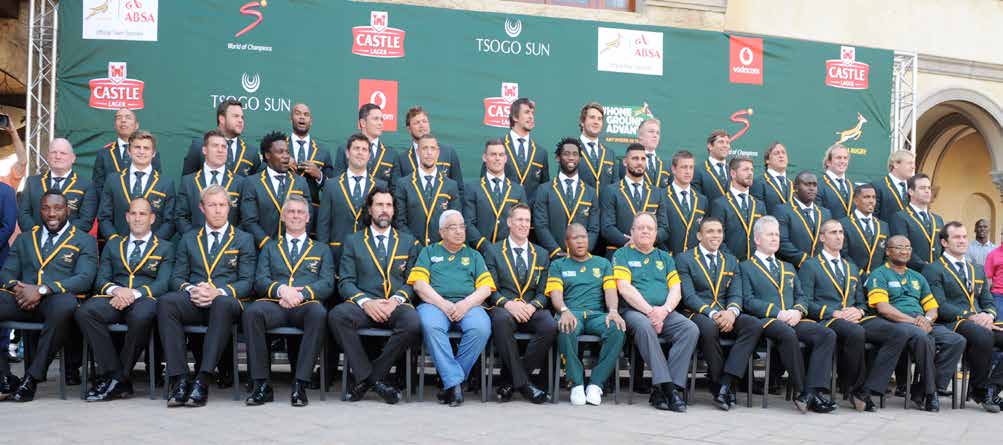 The eight-week tournament will be hosted in England and Wales, United Kingdom, from 18 September to 31 October 2015. The Springboks are in Pool B, which is made up of five teams, three from the northern hemisphere and two from southern hemisphere (South Africa and Samoa).
The eight-week tournament will be hosted in England and Wales, United Kingdom, from 18 September to 31 October 2015. The Springboks are in Pool B, which is made up of five teams, three from the northern hemisphere and two from southern hemisphere (South Africa and Samoa).
Show your support for the Springboks by wearing your Springbok jersey on Fridays.
South Africa vs Japan
Date: 19 September 2015
Time: 16h45
Venue: Brighton Community Stadium, Brighton
South Africa vs Samoa
Date: 26 September 2015
Time: 16h45
Venue: Villa Park, Birmingham
South Africa vs Scotland
Date: 3 October 2015
Time: 16h45
Venue: St James Park, Newcastle upon Tyne
South Africa vs USA
Date: 7 October 2015
Time: 16h45
Venue: The Stadium, Queen Elizabeth Olympic Park, London
Community radio gives rural youth hope
Community radio gives rural youth hope Estelle GreeffSport, arts and culture
 State-owned broadcasting signal distributor Sentech has launched another radio station, this time for the community of Nongoma in KwaZulu-Natal, giving young people in the area hope.
State-owned broadcasting signal distributor Sentech has launched another radio station, this time for the community of Nongoma in KwaZulu-Natal, giving young people in the area hope.
Nongoma FM, launched in June this year by His Majesty King Goodwill Zwelithini kaBhekuzulu, is proving to be an important tool of communication for the community.
The new player in the community radio industry aims to facilitate change and be the centre of rural and youth development.
Running on the 88.3MHz frequency, the community radio station broadcasts in and around the Nongoma village in isiZulu and English.
“With our area of broadcast being rural, the station’s objectives are mainly to educate and equip our listeners with information on how to better their lives and also provide them with entertainment.
“There is a void between rural and urban counterparts in terms of education, so it is our wish to fill this void by having programmes that will assist our young people,” said the station manager Siboniso Zulu.
He added that the station wants to give hope to future leaders and communities through guidance on what can be achieved when people work together and share a common goal.
The team working at the station is made up of young people who are either completing high school or tertiary education.
According to Zulu, the station has deliberately targeted young people to stimulate the mind-sets of goal-oriented youth to become the voice of change.
“News media is of fundamental importance not only to improve democracy and responsible politics, but also to supply information to educate our rural community about health, entrepreneurship, agriculture and sustainable livelihood.
“We give people a platform to voice their opinions to government agencies, corporates and social development organisations. This makes us an important social cohesion tool that seeks to create productive partnerships with all economic participants,” he said.
Some of the programmes broadcast were suggested by community members and carry content that is relevant to the people of Nongoma and surrounding areas.
Radio, particularly community radio, has an important role to play in nation building and social cohesion.
As with all businesses the station does face challenges. The biggest, said Zulu, is financial as the presenters do not receive a stipend for services rendered to the station.
Chris Ndamase, a 20-year-old from Nongoma village, is one of the young people employed by the radio station. He presents the 7am to 10am Monday to Friday show and the 6pm to 9pm show on Saturdays.
Although he is a newcomer to the radio industry, Ndamase has already interviewed well-known celebrities such as Zinhle Ngidi (Dj Zinhle) and Sindisiwe Zungu (Dj Cndo), to name a few.
The young talent completed his Grade 12 at Isolomuzi High School in 2013. When auditions opened for presenters for Nongoma FM he decided to give it a chance and he has not looked back since.
“I entered the auditions for a radio presenting position and was successful. I might not be earning a stipend but the experience and contacts made through this opportunity are invaluable,” said Ndamase.
He added that young people should take advantage of the opportunities given to them and once they have made it they should create opportunities for other young people.
“Young people need to understand that those at the top had to start somewhere too,” said Ndamase.


